#and as a fellow artist i can only imagine the feeling joe gets when his old practice sketches turns up (bad so so bad)
Photo

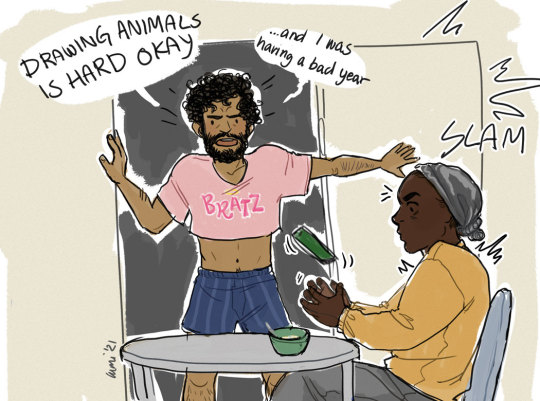
things i can’t stop thinking about: ugly medieval cats and that joe probably took a while to learn how to get animals and other living beings right (because drawing animals IS hard, stop bullying him nile)
#the old guard#tog#nile freeman#joe al kaysani#yusuf al kaysani#my doodles#my art#my sketches#i can't remember my own tags anymore whatevs#q#i love looking at ugly medieval art and as a fellow millennial i think nile would approve#and as a fellow artist i can only imagine the feeling joe gets when his old practice sketches turns up (bad so so bad)#nile: wait you actually made this one???#joe backtracking at lightning speed: uuuh no i didn't and you can't prove anything#joe: also you wouldn't happen to know where that drawing is being kept right now? not for any reason related to potential arson at all#meanwhile nicky is back in their bed where he was busy getting some morning gropes in before joe suddenly ran out of the room#wondering what the fuck just happened
2K notes
·
View notes
Text
Go Watch the Venture Brothers
So just heard the complete and utter Bullshit news that Adult Swim has cancelled one of (if not the best shows) they have the Venture Bros. This series is one of those shows that for WHATEVER reason never got to the level of fandom Rick and Morty has even though they’ve been at the genre parody game longer and in my opinion better.
The series is about Rusty Venture former boy adventurer and failing super scientist who in an attempt to keep his head above water in debt goes around with his two boys Hank and Dean, and bodyguard Brock on misadventues while various legal archnemisis go after him, such as the Monarch.
So if you never watched or never heard of this 7 season series let me give you a break down on why you should,
1) Art Style & Animation
Venture bros is one of those rare Adult aimed animated series that that really truly tries to utilize their medium to the best of their abilities. Season 1 had like such a small budget and corners had to be cut so it can be a little hard to watch at times.

But with each passing season they get a little better, a little more fluid, go just a little harder and it truly feels rewarding to watch. Like seeing an artist you follow online improve over the years. Like they COULD have stayed with the choppy and stiff animation from season 1 it fit right in with its fellow adult animated shows but it didn’t. They strove for quality to have something that matched the story they were telling.
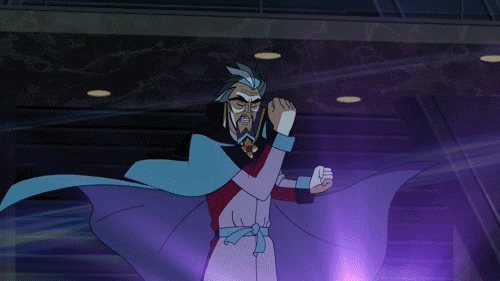
2) The Writing
Venture Bros has some of the tightest and consistently great writing of ANY serialized show I’ve seen, adult, animated or other wise. Wanna know why? Cause it’s all done by TWO people (save for like one ep each season where one other person is allowed to touch their baby). Yeah TWO people and they work their asses off every season to interject, humor, refrences, parody, plot and character development in equal measure.
3) Character Development
Um yes in case you were wondering that’s right an adult animated show has CHARACTER DEVELOPMENT that holds as the series goes on. Not to give spoilers but characters will go through changes in alignment, relationships will develop and change, some characters will go through negative arcs where they are straight up unbareable for a season before coming out the other side even better than they were before. There is no end of epsiode or even end of season reset. Characters, settings, and dynamics all change over the course of the show and it feels just so god damn good.
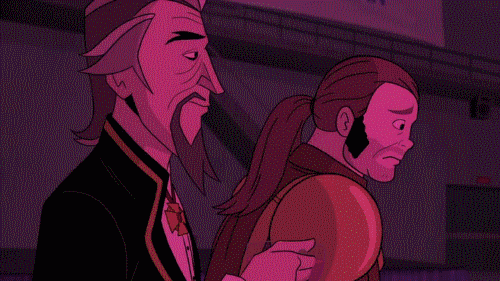
4) Story Development
Just like the characters the story of the Venture Bros grows and changes each season. Things that are set up even as early as season one are paid off as the series goes on. Like not to be that bitch but you know how RIck and Morty teases an overarching plot ALL THE TIME but like will often just spit in the face of fans hoping for more than like one episode a season addressing it? Yeahhhhhhh that doesnt happen here, fans are consistently rewarded for putting the time in to rewatch and really think about what happened in the series. Characters that are seen in the background or are just referenced by other characters will be brought in to be recurring characters, things that start off as a small detail or gag will be given larger relevance and each time they do this you get that “OH I remember that from last season! So thats what it was!” The writers WANT you to rewatch, they WANT you to analyze and they WANT you to theorize, and they give you a show that gives back the time you put in.
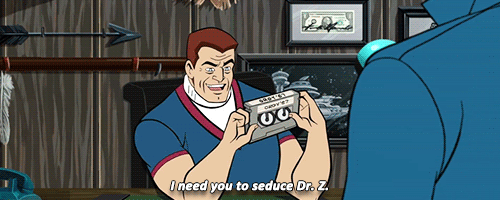
5) Parody & Reference
This series does a great thing with parody. They make real characters who are just as enjoyable as the characters they parody, they make story lines that both poke fun at the absurdity of the media but shows the writers love for it. So often parody and references are just used to mock the thing but with Venture Bros you feel the love and care so when you know the thing being parodied you can laugh but feel good about laughing cause they are never laughing at a thing maybe you cared for in your youth but rather laughing with it.
And it’s never just one thing. When they parody a thing its often layered with other things to make it even more unique. Scooby-Doo is overlayed with famous criminals, Laura Croft is mixed Dr. Quinn Medicine Woman, GI Joe is given the look of the Village People and so on. They never go for the easy joke or reference. Hell theres an episode that starts with them reciting the lyrics to David Bowies Space Oddity for really no reason other than they could. They weave these things in naturally with their setting and characters so nothing feels out of place. Like if you dont catch a reference or parody you dont feel like “I think this isa reference to something?” like a LOT of things do not just adult animated shows. You arent taken out of the moment cause it all feels so natural.
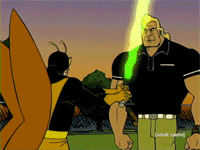
6) The Characters
God damn these characters, I could go on for hours about these characters. From main to one off these are some of the most likeable characters you can find. I mean it when I say I can’t think of a single character I wish they had cut cause they are all so well created. Even the ones I hate i have fun hating cause they were made to be that way. I’ll be good though I’ll only talk about my absolute top faves.
- The Monarchs

You ever sit and wish villain couples could have functional healthy relationships? Well look no further than Malcom Fitzcarraldo aka The Monarch and Dr. Shelia Girlfriend (yes that is her last name). The Monarch is a high strung impulsive saturday morning cartoon villain whos tendency to over react is only matched by his unspecified hatred of Dr. Venture. And Dr. G is his nonsense partner in crime who will cut a bitch if they don’t play by their admittedly weird rules. Both characters are great on their own but are better together. Though that doesnt mean they always get along. Like a real couple they have their ups and downs they fight, break up, make-up and grow stronger in their relationship with each season.
- Shore Leave
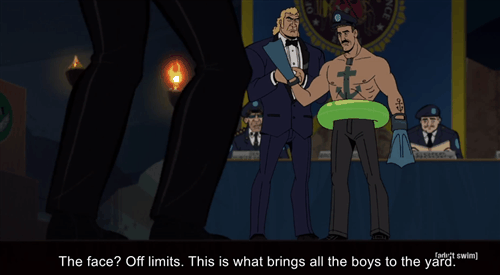
Ok ok so I want you to imagine James Bond, mixed with GI Joe simmering in a cocktail of the most flamboyant gay men you have ever seen and you have one of my favorite gay characters/characters in general. Shore Leave is a member of OSI (the shows SHEILD/GI Joe parody organization) he’s loud, brash, flippant, sassy and highly competent at his job loving every second of getting to beat bad guys down within an inch of their life. I love seeing him play off the stoic Brock and the two have this great brotherly dynamic that’s never called into question. He also gets to have a very cute romance with Al the Alchemist (who is also great). I could talk about this man all day.
- Dr. Rusty Venture
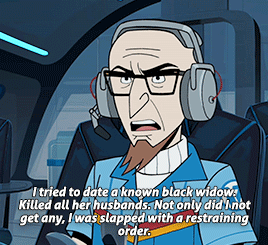
They did such a good job with this man. He’s a self serving, sexist, perverted, whinny, self important asshole and yet you feel pity and genuine sympathy for him and want him to succeed. You can see how Dr. V was given a raw deal by his father who seemed to care more about his adventures than his sons well being and how this molded him into the bitter man he is today, but on the flip side you can see where he chose to use that as a crutch for his worst behaviors and impulses. Seeing him slowly grow and change and be an actual good father to his boys while all the while still be a giant dick is actually really great.
- Dr. Byron Orpheus
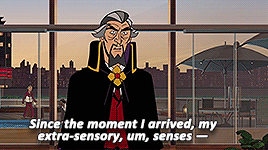
Ahhhhh Dr. Orpheus part Dr. Strange Parody part busybody stay at home dad, he’s just such a delight. Dr. Orpheus is a divorcee, with an unfulfilling job of maintaining order to the cosmos (which isnt as hard as one might think), and uses his magical ablities in ways most of us would (ie menial tasks and home chores). Overly dramatic and affectionate Dr. O is a delight whenever he appears, but he’s at his best around his daughter and old friends The Order of the Triad.
Again I can go on but all these characters ranging from main to recurring are crafted with the utmost care for you to want to see them succeed or fail, to see them again even if you know it’ll never happen, and want them to cross paths with other characters.
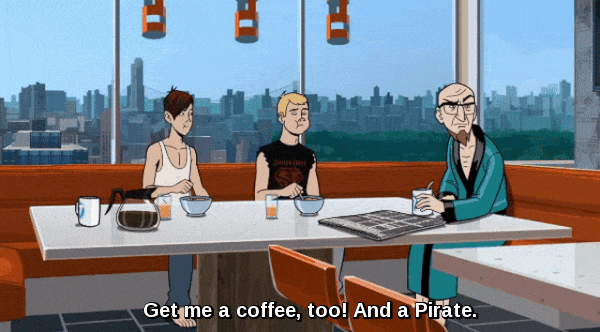
The Venture Bros is one of those series that I will ALWAYS recommend even to the pickiest of humor tastes. But if you don’t believe its as good as I said or don’t think the concept is to your tastes I’ll recommend a few eps that I think best show off the base idea of the series without giving much away. In terms of plot and spoilers, though somethings wont make a lot of sense.
- S1 ep10 "Tag Sale – You're It!" - Dr. V is having a yard sale so of course all manner of costumed weirdos show up.
- S2 ep5 "Twenty Years to Midnight" - basically a fetch quest around the world to save the planet with daddy issues
- S3 ep2 "The Doctor Is Sin" - Again daddy issues but with one of the best recurring characters and a great showcase of the series deeper emotional plots
- S4 ep6 "Self-Medication" - Really embraces the parody as Rusty goes to a former boy adventurer support group.
Anyway the show is 7 seasons with 80 episodes, please go watch it. I will never forgive @adultswim for cancelling what was to be their final season. And in closing GO TEAM VENTURE!
#venture bros#the venture bros#venture brothers#adultswim#adult animated shows#animated shows#animation#go watch this show#go watch#adult animation
1K notes
·
View notes
Text
Book of Nile: Burlesque AU

Shout out to @winterequinoxx @yeahwellyourface @druidspell @rainofdreams29 @shebattlesman @highlightcity159 @ruby-white-rabbit and the Book of Nile chat for this one. Y’all are legit INSPIRING.
Based on the super corny and cheesy but “Awesome when I watch it while drunk” movie Burlesque starring Cher and Christina Aguilera.
Nile is an aspiring singer who left Chicago for Los Angeles in order to realize her dreams of becoming a recording artist. She writes her own songs and has a voice that is devastating, a born star. However, she’s down on her luck when she stumbles into the burlesque theater owned by one Andromache or “Andy” as everyone calls her. Andy’s wife, Quynh, is the main costumer of the performers. Nicolo “Nicky” is the club’s choreographer for the routines. He’s married to Yusuf or “Joe” as his friends call him. Yusuf plays the trumpet and is the band leader for the in-house jazz ensemble.
And then there’s Sebastien “Booker” le Livre. An older, washed up bartender, he also originally came to L.A. to be a songwriter. Except his dreams died long ago after his wife left him and moved back home. His life spiraled out of control and the only reason he’s got the job as the burlesque’s bartender is out of pity from Andy. He’s bitter, bored out of his mind and feels like his life is going absolutely nowhere...well, that is until Nile breaks out into singing Etta James’ Something’s Got a Hold on Me when there’s a glitch on the lip syncing track during a burlesque performance at the club.
Booker falls head over heels for her right then and there. Inspired by this siren, her work ethic and sheer unadulterated talent, he starts secretly writing music again. For she’s his muse who he imagines performing his songs. He keeps it all to himself though. Because there’s no way in hell a woman like her will go for an old failure like him. Content to watch Nile perform and her star rise with each passing week, Booker thinks being able to look but not touch is enough to sustain him.
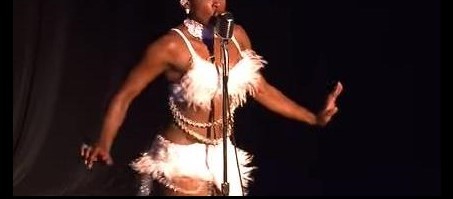
That is until Nile’s motel room where she’s staying gets broken into and she gets her life savings stolen. Since she has no savings and no safe place to stay, Booker finds himself offering to let her stay with him in his bungalow that he used to share with his ex-wife. Nile takes him up on the offer and moves in with him. Except she soon finds herself attracted to him. Sure, he’s sarcastic and all up in his maudlin feelings when he drinks. Yet he’s also doing little things for her around the house. Every time she tries to pay him back, he waves her off. It’s almost like he lives to serve in his deference to her.
Meanwhile, Andy has mortgaged her club far too many times and owes the bank hundreds of thousand of dollars. Merrick, a shitty real estate developer, is gleefully waiting in the wings for Andy to default on her latest mortgage. He’s pissed because she keeps rejecting his offers to buy the place. So he sends his minion in Keane to spy on the club and make sure Andy defaults so that Merrick can take over the property. He plans to demolish it to build luxury condos on the site.
While at the club, Keane spots Nile and wants her for himself. He starts pursing Nile and she starts dating him. However, she quickly realizes her heart isn’t into it. Not to mention, Keane comes off as more and more of a raging asshole with each passing date. Even after he wines and dines her and gifts her a killer pair of crystal, Louboutin red bottom heels.
At the same time, Booker and Nile find themselves falling for each other. There’s so much sexual tension and neither of these beautiful idiots have any place to put it. That is until they hook up one night after stumbling home drunk from the wedding reception of one of Nile’s fellow burlesque dancers. They sex is mind blowing and they realize that perhaps, maybe this can turn into a relationship.
The problem? Nile wakes up to Booker’s ex-wife screaming at her in their bungalow. Turns out Booker never finalized the divorce and his ex wants him back. That also means he technically cheated with Nile since he’s still legally married to his wife. Understandably pissed the fuck off, Nile moves in with Joe and Nicky and tells Booker to never speak to her again.
While Nile lives with them, Joe and Nicky reveal to her the rocky start to their own relationship. Nile is stunned, as they’re clearly still in love with each other after all of their years of marriage.
Trained as a ballet dancer in Genoa before moving to Milan to dance at the famous La Scala Theater, Nicky sustained an injury that ended his career. He wandered the world trying to find himself. It ultimately led to him ending up in L.A., broke and with no idea of to do with his life. That’s where he met Quynh and Andy, who gave him a job as a first line dancer at their club. After seeing his talent, they promoted him to the club’s choreographer.
Meanwhile, Joe loves playing jazz, but it’s a dying art. So he while he adores working at the club before Nicky got there, Nicky was a snotty asshole to Joe since Joe didn’t write his own music. Mostly, Joe would provide the instrumentation to the music Booker wrote, which is how he and Booker became best friends.
Unfortunately, Nicky saw Joe as creatively bankrupt while Joe pointed out that Nicky was a failure in his ballet career. They hated each other initially. Over the years, Nicky became less of an asshole, taking pride in his choreography. He also found himself falling in love with Joe. Working to earn Joe’s forgiveness for his initially bristly personality, Nicky made amends. He and Joe started dating and soon Joe proposed. They’ve been inseparable ever since.
Joe quietly reminds Nile that Booker is a broken man who needs to heal himself before he’ll find himself worthy of her. He knew Booker before his life went to shit and his wife divorced him. Once Nicky finally made amends with Joe, Booker became Nicky’s friend as well. So they both know Booker can be a good man. But again, he needs to work on himself.
As for Nile and Keane? The final straw comes when she sees the plans for Merrick’s condo at Keane’s place. She realizes that Keane has been working for Merrick the entire time and doesn’t give a fuck about the club being shut down and her losing her livelihood. Nile dumps Keane and takes her information to Andy.
With only a few days before Andy defaults on her loan, Nile realizes that they could potentially save the club. As there’s another luxury condo development being currently built across the street. They ask to meet with the owner, who turns out to be Copley. Copley used to work for Merrick but quit after he found out Merrick’s shady business dealings. So Copley is all too happy to pay Andy for the air rights to her club. This guarantees that Copley’s luxury condos retain their views of the Pacific Ocean. It also gives Andy the money she needs to pay off the mortgage and save the club.
Booker finally apologizes to Nile and shows her the paperwork that he’s in the process of finalizing his divorce from his wife for real this time. He also confesses his true feelings for Nile, showing her all of the songs he’s written that she inspired in him. He also admits she’s been his muse and apologizes if that comes off as creepy. He really does see her as an equal and was straight up overwhelmed with his feelings for her when he saw her sing for the first time.
They reunite and everything closes out with Nile singing a song she and Booker cowrote that works with Nicky’s choreography and Joe’s instrumentation skills with his trumpet and leading the band.
Playlist
Yoncé/Partition - Beyoncé
A Night Like This - Caro Emerald
Ended With The Night - Caravan Palace
Jolie Coquine - Caravan Palace
Something’s Got a Hold on Me - Etta James
Chambermaid Swing - Parov Stelar
All That Glitters - Earl
Gnossienne 1 - Erik Satie
Toxic - Britney Spears
Could’ve Been - H.E.R.
Cuz I Love You - Lizzo
Undo - JAMi2
Forgive Me - Chloe x Halle
Rocket - Beyoncé
Bomba - JAMi2
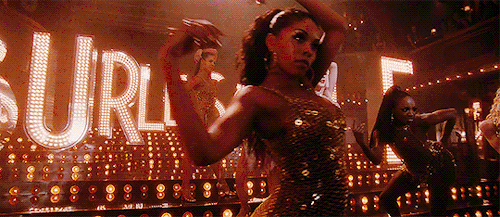
#book of nile#booker x nile#nile freeman#booker#sebastien le livre#booker/nile#nile/booker#the old guard#fanfiction#alternate universe#au#mood board#why do these two fit so well in so many scenarios tho?#tog
61 notes
·
View notes
Photo

Action Comics #692 (October 1993)
In this issue: Superman goes to the doctor and finds out why he's not dead anymore! But, before that, he's clearing some of the debris left by his fight with Doomsday when he finds... Clark Kent? Lois Lane is very happy to see Clark again, but Superman himself doesn't look very thrilled in these panels.
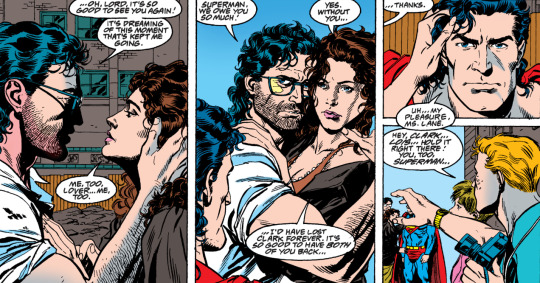
Turns out Clark wasn't dead as everyone believed, he was simply trapped in the basement of a collapsed building! The basement happened to equipped with plenty of food and gym equipment (explaining why he's still jacked, like Superman), but unfortunately not a single pair of scissors (explaining why his hair is now long, like Superman's).
Later, Superman bumps into Lex Luthor Jr., who demands to know where Supergirl is, but Superman gives him the runaround. Hmm, where could Superman's good friend who can change shape and pretend to be other people be? Anyway, Superman then meets Lois and Clark and... holy crap! Mild-mannered reporter Clark Kent is secretly Supergirl!
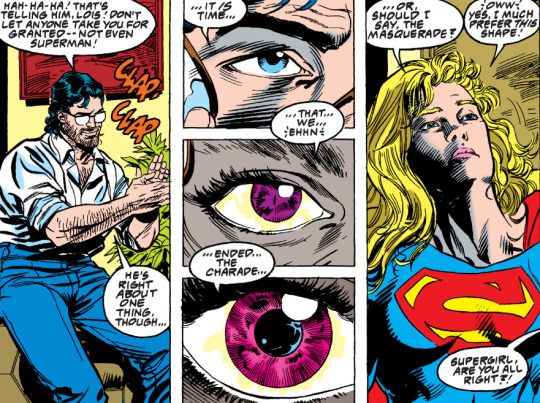
So yeah, Supergirl pretended to be Clark for a while just so he and Superman would be seen together and no one would question why both are suddenly alive again. Then Supergirl leaves and we move on to the second dilemma solved in this issue: How the hell is Superman alive again? To address that question, supernatural DC character (and fellow Jerry Siegel/Joe Shuster creation) Doctor Occult appears out of nowhere and rudely teleports Lois and Clark to a black void, where he replays moments from Superman's life... and death.
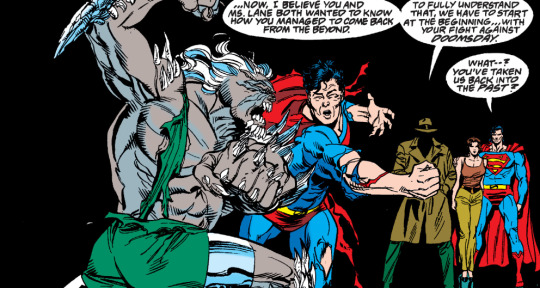
Occult explains that Doomsday DID punch Superman's spirit out of his body, but there was still solar energy keeping the body just barely alive. Superman's ghost ended up stuck between the living and the dead, attracting some nasty soul-eating demons. Fortunately, Pa Kent happened to be dying of a heart attack at the same time, so he and Superman teamed up to fight off the demons (as seen in Adventures #500). Superman’s soul returned to his near-corpse, which was taken to the Fortress of Solitude by the Eradicator and lovingly nursed back into health. (Okay, more like “coldly,” but you can’t argue with the results.)
Anyway, the point is that Superman's resurrection happened due to a convoluted series of events that could never be repeated, unless someone's willing to sneak behind Pa Kent and blow an airhorn in his ear or something. As the mystical exposition dump ends, Occult teleports Lois and Clark to Smallville, and the issue ends with the Kents finally reuniting. A tender moment...
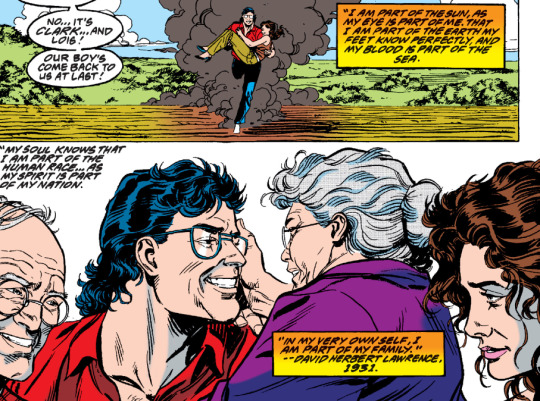
...until two seconds later, when Ma smacks Clark in the back of the head for taking two whole issues to come see them (or that’s what I’d do).
Plotline-Watch:
Doctor Occult reveals that the moment when Bibbo shocked Superman’s body with a hyper-charged defibrillator in Adventures #498 actually helped keep him alive. Once again, Bibbo is the real hero of this saga.
Supergirl has a lot of experience posing as Clark, since she was stuck in that form between 1989 and 1992. That was also her in the only other photo of Superman and Clark together, taken in Superman #34.
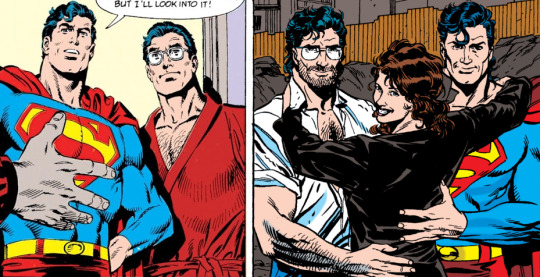
While Superman is being interviewed by a news crew after rescuing "Clark", that lawyer from Action #689 barges in and demands that they stop calling Superman Superman, since that name is now trademarked by Superboy's manager. Damn, maybe he's gonna have to start calling himself "Supreme" or something?
Aww, Lex is happy to see Superman again. Sure, it's only because he wants to be the one to kill him, but still.
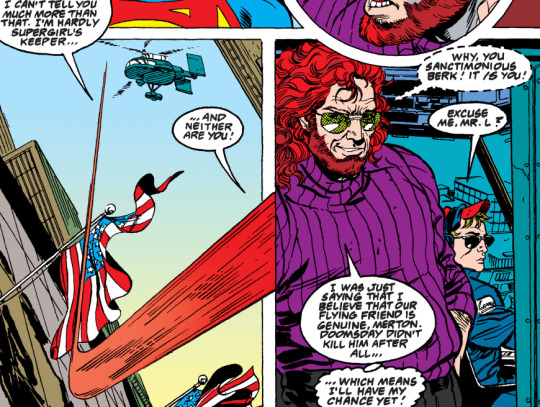
S.T.A.R. Labs is examining the Eradicator's corpse when they realize he's alive! Sort of. Later, Doctor Occult remarks that the Eradicator sacrificed himself "in mind, if not in body". Hmm. The doctors overseeing his condition are Kitty Faulkner, who can turn into an orange She-Hulk called Rampage after a workplace mishap, and a new character called David Connors, the only S.T.A.R. employee without superpowers. So far.
The JLA returns from the little space vacation the Cyborg sent them on, and we get the first instance in all of comics of Guy Gardner admitting he was wrong. Character growth! Don Sparrow says: “Nice to see some follow-up to the characters around the DCU and how they react to Superman’s return. No mention of the fact that they got suckered into a mission into space that went nowhere.”
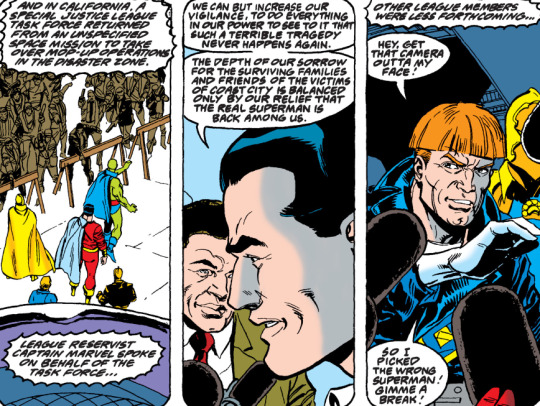
When Doctor Occult shows up, Superman is like "aw, not this guy again!", referencing that classic tale of Superman's first encounter with the supernatural... which hasn't come out yet. Don: “It’s a neat forward call-back (is that a thing?) when Superman references his first encounter with Doctor Occult, given that we won’t see it happen until 1995, when DC does a line-wide ‘Year One’ series of stories. And wouldn’t you know it, that story is written by none other than Roger Stern (and even involves tentacles, as in the thumbnail image)!” #rogersternplaysthelonggame
Don Sparrow's section, on the other hand, can be read NOW, after the jump!
Art-Watch (by @donsparrow):
We open with the cover, and it’s one of the top ten best of this era, for sure. Drawn by Kerry Gammill and Butch Guice, DC used this drawing on the “Return of Superman” cards. I tend to favour simpler, iconic covers, even when they don’t necessarily represent the story within, but in this case, it’s showing exactly what the heart of the story is about: Clark Kent is back.
Inside, we open with a full page splash of Superman’s shield, through tons of rubble, and it’s a great image, but without the face, it allows us to focus on the title of the story, a callback to the speech introduction of the old Fleischer Cartoons.
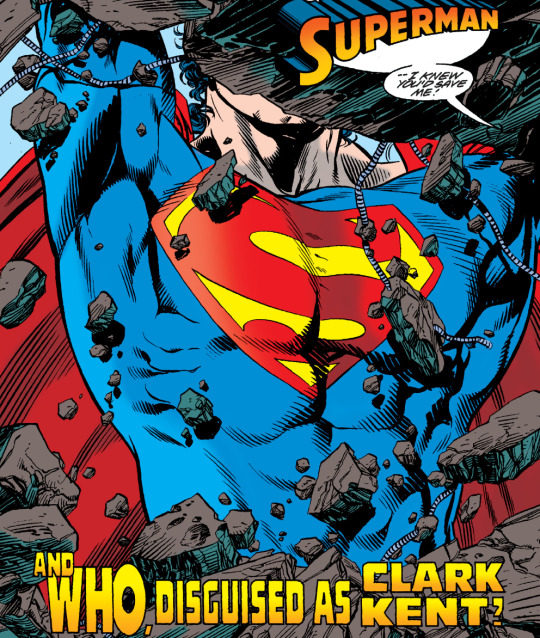
I don’t know if it’s from the writing, or the artist, but Action Comics has always seemed the most romantic of the Super-titles, and this one is no exception, as Clark and Lois have their hands all over each other for basically the whole comic. While it is a bit weird to remember that it isn’t Clark that Lois is caressing (more on that in a bit) in the early part of the story, it always feels intimate and romantic more than it feels graphic or titillating. A tricky balance that this team pulls off well, particularly in their “reunion” on page 3. [Max: Every time I read this issue I think it’s Martian Manhunter posing as Clark and when they start flirting I’m like “ew”. Then I remember who it is and I’m like “nice”.]
I always enjoy seeing Superman flying upside-down, which I consider to be a Byrne innovation—I don’t remember him doing it pre-Crisis. It always seems so joyful and carefree, and it’s nice to see Superman savouring his powers.

Jackson Guice uses tone very well in the scenes with Lex Luthor II in his aviators, and I quite like the sense of motion to Superman’s pose as he approaches the helicopter—almost like he’s swimming in the sky rather than floating.
It’s a good drawing of the Eradicator getting the post-Hoth Luke Skywalker treatment, with David Connor and Kitty Faulkner getting an eyeful. My copy has a slight colouring error that makes it look like the Eradicator is awake in the tank, even though he’s supposed to be catatonic. [Max: Still looks like that in the collections. Maybe he’s one of those people who sleep with their eyes open?]
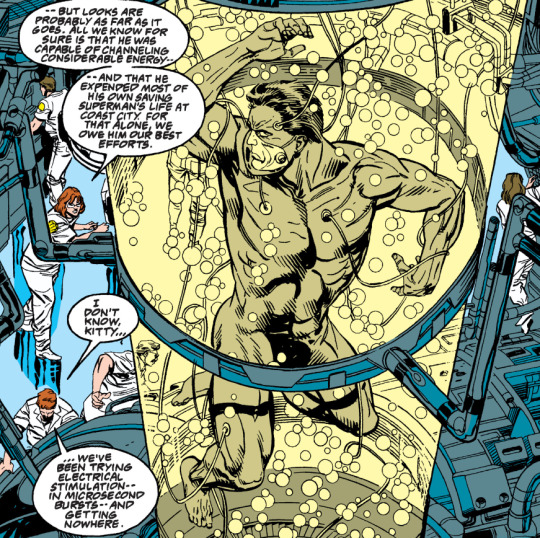
Superman embracing Lois after the ruse of “Clark Kent” is very cutely drawn, as is the Ghost-like backward embrace on the following page.
The entire sequence replaying Superman’s death and rebirth is drawn well throughout, especially the dreamlike staging, and the darkness as Lois knocks the flashlight away. It’s also moving that Superman can see the heroic lengths that Bibbo went to try to save him once Superman succumbed to his injuries.
Lastly, it was wonderful to see Clark reunited physically with Ma and Pa, especially with the nice touch of the poem by DH Lawrence as the only narration. Stern was always the best at referencing secondary texts in his stories, and it’s well used here.
STRAY OBSERVATIONS:
Is it me, or is Matrix/Supergirl a little too into this Clark Kent act? I get that making their performances light and funny keep it from seemingly overtly dishonest, but “Clark” is pretty tender in these scenes. Lois does a good job of playing along, but it’s hard for me to fully forget that all this canoodling is actually with Supergirl. So as a helpful tool, I created these graphics: [Max: Nice.]
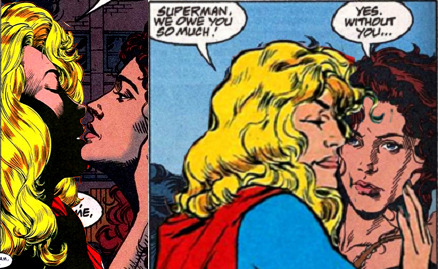
It was cool that Lois specifically mentioned that Jimmy got a shot of the returned Clark Kent next to Superman, I always like it when that can happen.
In previous posts, I’ve talked about how creepy it is that Luthor has a sexual relationship with Supergirl/Matrix, when she is in so many ways (mainly mentally) a child, and I can’t help but read the scene where Lois chooses Superman over “Clark” this way. The laughing and clapping has a whole different feel if you think of her as mentally diminished somewhat.
So it’s not exactly a continuity error that Clark says on page 13 that he has to call Ma and Pa to let them know that “Clark” is alright (even though he already called them in a previous issue). It could be that they want to tell the Kents the cover story of Clark’s return has now taken place, and they can act like their son is alive again when they go to the corner store, etc. [Max: Yeah, that’s how I took it. It would be awkward if their neighbors saw them all cheerful while their son is still “dead”.]
I like to imagine that Dr. Occult looks and sounds like Robert Stack. [Max: It’s impossible for me to hear him as anyone other than Humphrey Bogart after Lois calls him “Sam Spade”.]
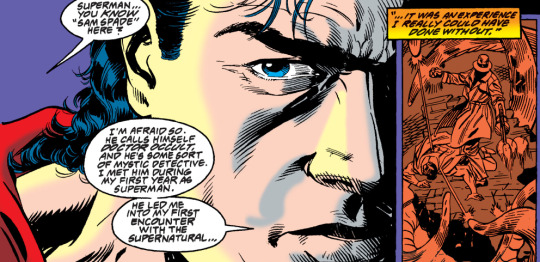
We’ve mentioned previously Jackson Guice’s tendency to use photo reference for his characters. In this issue, Superman looks a lot like Jason Patric to me, who would have made a pretty great Superman had there been movies being made in this time.
I also appreciated this issue explaining both the physical and metaphysical reasons Superman was able to return—and that there’s no back door to the story—if Superman ever died again, he would be unable to return.
#superman#roger stern#jackson guice#denis rodier#supergirl#justice league#guy gardner#rampage#eradicator#doctor occult#pa kent#ma kent#bibbo bibbowski#S.T.A.R. Labs#cat grant#captain marvel#roger stern plays the long game#nice
31 notes
·
View notes
Text
Oh, Baby (Ben Hardy and Joe Mazzello)
Summary: On a visit to Ben’s film set, Joe witnesses Ben enjoying a baby for the first time, which gets each of them thinking...
A/N: This was written for “First Time” prompt for Hardzzello Week. During in my holiday shopping at a crafts fair, I saw items that inspired my descriptions of gifts, though the ‘piece de resistance’ was a real thing!! Other writings featuring Joe and Ben (together and individually) can be found in my Masterlist
Warnings: A somewhat crass reference to baby making, but other than that, just fluff and love!
Joe woke up an hour before his alarm was set to go off. As always, his first image upon waking was of Ben. Usually, he snuggled under the covers and flipped over, letting himself indulge in his mind’s reel showing highlights of their past times together and previews of their anticipated visits. Today, was one of those visits; he was travelling to Montreal to see Ben as he finished taping The Voyeurs. Joe set a record in getting ready, and 20 minutes later he was getting into his Uber, planning to catch an earlier flight.
The wheels touched down two hours before his expected arrival. As the cab drove him through downtown Montreal, he saw an outdoor crafts fair, festively decorated, set up for the holiday season. He noted the cross streets in his phone and vowed to stop by for some Christmas shopping for his family. His first priority though was seeing Ben. He arrived at the set and checked in with the guard who found his name on visitor list.
He entered the cavernous sound stage where multiple scenes were being set up. Cameras framed the perimeter. Staff were moving props and equipment. He looked around for a wave of blond hair. Walking around a corner to another set, off in the distance he saw the unmistakable handsome man in his life. But, wait, what was he doing? Joe did a double take.
Ben was standing next to a woman seated with a car seat and diaper bag beneath her. He was holding a baby on his hip, one hand supporting the baby’s bottom, the other wrapped snuggly around its upper back, cradling its head against his shoulder. And what was particularly endearing was Ben masterfully and naturally doing The Baby Dance - shifting from leg to leg, swaying his hips loosely, giving the baby a little bounce and maintaining eye contact. He looked like a pro! It was a new image of Ben. At family events, Ben interacted with Joe’s older nieces and nephews warmly. He cracked jokes, played board games and kicked a soccer ball with them outside. They loved his energy and humor. But he had not interacted with the babies. Truth be told he seemed a little intimated at the prospect.
Staring at his love across the room holding a baby filled Joe with excitement and awe. His stomach tightened. He was thrilled to see Ben for the first time enjoying a baby. Occasionally, the topic of children came up, but they hadn’t seriously discussed it, though Ben knew that Joe was eager to have a family. Joe wondered if maybe now Ben could envision them having a family too. Joe breathed deeply and took in the sight a little longer before making his way over to Ben, who was now chatting with the seated woman, alternating between looking at her and cooing at the baby, who looked at him.
As Joe approached, Ben’s face lit up and he walked toward him. “Ohmygod-you’re here early! What a nice surprise! Hi, You!” Ben leaned over and kissed Joe’s cheek, proudly holding the baby and thrilled to see Joe.
“The early bird gets the worm. Hopefully.” Joe couldn’t resist. “Hmm. I see you found a substitute for my attention, though probably not as articulate and witty, I dare say.” Joe said in his charming, slightly haughty manner. He looked at the baby who appeared to be about four months old. “And who is this charming fellow?” Joe asked, stroking the baby’s onesie-covered arm.
“This is Christopher. And this is his mom, Anna,” Ben said, turning toward Anna who gave a wave. She’s a grip. Her nanny is only available in the afternoons for a few days, so Christopher has been our special guest on set.”
“Anna,” Ben said, shifting Christopher over to his other hip and resuming The Baby Dance, “This is my…Joe. Joe Mazzello.”
“Hi, My Joe,” Anna said with a laugh, and Joe and Ben joined in. Joe and Ben locked eyes. Though they were established as a couple in their social circle, they were still figuring out their positioning in the world. Joe really hated the term ‘boyfriend,’ which tripped Ben up during introductions. My Partner? My Man? Of course, it would be easier if it were just ‘ My Husband,’ Ben had thought lately.
Anna continued. “I’ve heard so much about you-and the great Uncle you are. Ben’s been so helpful caring for Christopher between taping before my sitter arrives. He’s such a natural, and Christopher has really taken to him.”
“My nieces and nephews always enjoy spending time with him.” Joe said beaming. Ben was called for the final scene for the day. Once Ben finished work, the boys bid farewell to Anna and Christopher and headed out. They settled into Ben’s rental car, Ben at the driver’s seat. Joe looked over at Ben. He couldn’t shake the image of Ben holding Christopher, and it filled him with a warm rush.
“What?” Ben said, feeling Joe’s eyes on him, pausing before starting the car. “You’re worried about me driving?” he laughed.
“Well, there’s that, now that you mention it,” Joe said with a laugh. Then he reached out and touched Ben’s hand, which was resting on his thigh, holding the car keys.
“No, actually, I keep picturing you holding Christopher. It was just….so beautiful. And you seemed to like it. Did you?” Joe asked somewhat tentatively, concerned about the prospective answer.
“Yeah,” Ben responded. “I did. I really did. I mean, I was nervous at first. Anna helped me feel more comfortable. It was amazing having another person respond to you. Want you. When he laughed at my antics, it made me melt. And, this sounds weird, but that feeling of holding him - It’s hard to describe. It was like no other physical connection.”
Joe smiled broadly, happiness overtaking him. “I totally get it. I’ve felt the same way with my nieces and nephews. I think it would be stronger when…it’s yours. I mean, if…when you’re the father.”
‘Yeah,’ Ben said, staring out the windshield. “I’ve imagined it.”
“You, you have?” Joe asked, trying to contain his excitement, eagerly wanting to hear more.
‘Yes, at night, when I go back to my flat, you know, I picture this…story. Where I have a baby. WE have a baby,” He clarified, looking over to Joe. “There are a few scenes. First, I see us taking it home after it’s born and then staying up at night taking turns holding it, singing, reading, walking, trying to get it to sleep.”
“You were quite a rocker and a roller in your baby dance with Christopher,” Joe noted.
‘Yeah, it did seem to help keep him calm.” Ben said.
“What else did you imagine?” Joe asked, wanting to conjure the images too.
“Well, the baby was restless and nothing was working so finally, we put it between us in bed and we both held it. We all fell asleep together. Then, I fast forwarded to the baby being older and we went to the playground. We pushed it in the swing. I was in the front of the swing, you were behind it. Sometimes, I held its legs when the swing came forward, and you held the swing from the back so it was suspended, and the baby giggled. Then we sang Queen songs in time to the swinging, really getting into it, and the baby was clapping and laughing. Like we were two cool, creative, fun dads.
“I bet we would be.” Joe said. “Wow, those are really nice images. It’s nice to hear you’ve thought about them.”
Joe leaned over and kissed Ben softly on the lips. Ben turned his body to Joe, and the keys slid off his lap as he moved his arms around Joe’s neck and deepened the kiss. They made out passionately until Joe pulled away, breathing heavily. “It’s a good thing you can’t get pregnant, ‘cause I swear to God, I’d want to take you home right now and…”
“Really, Joseph,” Ben cut him off. “Wouldn’t you want to make an honest man of me first?”
“Yes, yes, absolutely, I would.” Joe said between pants. “And I want to continue this make-out session, but…Seasonal topic change! I have to do some Christmas shopping, and I saw a cool crafts fair downtown. I thought maybe we could stop there before heading home.”
“Sure,” Ben said, slightly out of breath. “I’m game. May find a few things as well.”
After parking, Joe pulled up his Christmas shopping list on his phone. “Ok, let’s split up – I’ll be more efficient that way - and meet at the Hot Chocolate stand over there in 45 minutes,” Joe said, motioning to the little café area.
“Sounds good,” Ben said.
Joe made the rounds and found silver amethyst earrings for his sister, an intricate turquoise necklace for his mom, hair accessories and hand-decorated Girl Power journals for his nieces and a big stuffed dinosaur for his youngest nephew. He walked by a stand with a hodgepodge of jewelry and eyed a rack of bracelets. His gaze gravitated to a thin, earthy brown leather bracelet with subtle streaks of gold. He took it off the rack and put it on his wrist as he imagined giving it to Ben as an engagement ring of sorts. Yes, he would make an honest man of him first. Joe took off the bracelet and fingered it, playing out a scene of giving it to Ben on a sunset beach, though truthfully, he didn’t want to wait that long. He made a mental note to Google most romantic places to propose in Montreal. His reverie was interrupted by the saleswoman. “Oh, that’s a lovely choice, made by a local artist. Happy to give you his card.”
Joe checked his watch and made a bee line to the Hot Chocolate stand. He was pleased that he got through most of his shopping list, but ecstatic by his last purchase. He felt high thinking about them committing to each other in a formal way and….Suddenly, Ben ran up to him. “I have to show you what I found!” He pulled a garment out of one of his bags. It was a white, long-sleeved baby onesie featuring a repeating montage of small beagle dogs engaged in different activities: walking with a bone in its mouth, sitting wearing glasses reading a book, snuggling next to a dad dog with a tie, chasing a ball, sleeping with a teddy bear under its paw. Each image was drawn with fine black pen and featured a burst of a primary color-the bone was yellow, the book was blue, the tie was red, the ball was orange and the bear was green. Ben couldn’t contain is excitement, “Isn’t this the CUTEST thing? I got one for Christopher. And another one.” He looked at Joe. “In case, you know, we need another baby gift.”
“Very cute and good planning.” Joe said, touching the soft clothing.
“How did you do?” Ben asked.
“Oh, I finished most of my shopping for the fam. And an unexpected thing or two. A successful expedition.” Joe said, feeling a wave of emotion thinking of the bracelet.
Joe reached for Ben’s hand, as they walked to the car, each of them looking forward to their visit -- and their newly-envisioned future.
@warriorteam1924 @lapofthemusicgods @nightoftheland @heybuddy-drabbles @hey-holtzy @im-an-adult-ish @halfasleepoetry @roger-taylors-car
#ben hardy#ben hardy fanfic#joe mazzello#joe mazzello fanfic#hardzzello#ben hardy fluff#joe mazzello fluff#Bohemian Rhapsody#bohemian rhapsody fanfic#6 underground#six underground#gay family#gay fanfiction#gay love#bohemian rhapsody fanfiction#lgbt love#marriage proposal#hardzzello week#hardzello week#hardzello#baby love
49 notes
·
View notes
Text
The Chiseler Interviews Tim Lucas
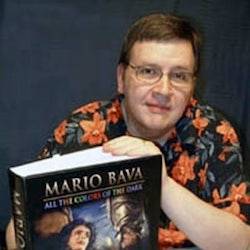
Born in 1956, film historian, novelist and screenwriter Tim Lucas is the author of several books, including the award-winning Mario Bava: All the Colors of the Dark, The Book of Renfield: A Gospel of Dracula, and Throat Sprockets. He launched Video Watchdog magazine in 1990, and his screenplay, The Man With Kaleidoscope Eyes, has been optioned by Joe Dante. He lives in Cincinnati with his wife Donna.
The following interview was conducted via email.
*
THE CHISELER: You're known for your longstanding love affair with horror films. Could you perhaps explain this allure they hold for you?
Tim Lucas: I suppose they’ve meant different things to me at different times of my life. When I was very young (and I started going to movies at my local theater alone, when I was about six), I was attracted to them as something fun but also as a means of overcoming my fears - I would sometimes go to see the same movie again until I could stop hiding my eyes, and I would often find out they showed me a good deal less than I saw behind my hands, so I learned that when I was hiding my eyes my own imagination took over. This encouraged me to look, but also to impose my own imagination on what I was seeing. Similarly, I remember flinching at pictures of various monsters in FAMOUS MONSTERS OF FILMLAND magazine, then realizing that, as I became able to stop flinching, to look more deeply into the pictures, I began to feel compassion for Karloff’s Frankenstein Monster and admiration for Jack Pierce’s makeup. You could say that I learned some valuable life lessons from this: not to make snap judgements, not to hate or fear someone else because they looked different. I should also point out that beauty had the same intense effect on me as ugliness, in those early days at the movies. I was as frightened by the glowing light promising another appearance by the Blue Fairy in PINOCCHIO as I was by Stromboli or Monstro the Whale. I also covered my eyes when things, even colors, became too beautiful to bear.
As I got older, I found out that horror, science fiction, and fantasy films often told the unpleasant truths about our world, our government, our politics, and other people, before such things could be openly confronted in straightforward drama. So I’m not one of those people who are drawn to horror by gore or some other superficial incentive; I have always responded to them because they made me aware of unpopular truths, because they made me a more empathic person, and because they sometimes encompass a very unusual form of beauty that you can’t find in reality or in any other kind of film.
THE CHISELER: I'm fascinated by what you term "a very specific hybrid of beauty that you can’t find in reality or in any other kind of film.” Please develop that point.
Tim Lucas: For example, the aesthetic put forward by the films of David Lynch... or Tim Burton... or Mario Bava... or Roger Corman... or Val Lewton... or James Whale... or F.W. Murnau. It's incredibly varied, really; too varied to be summarized by a single name, but it's dark and baroque with a broader, deeper spectrum of color. I’ll give you an example: there is a Sax Rohmer novel called YELLOW SHADOWS - and only in a horror film can you see truly yellow shadows. Or green shadows. Or a fleck of red light on a vine somewhere out of doors. It’s a painterly version of reality, akin to what people see in film noir but even more psychological. It might be described as a visible confirmation of how the past survives in everything - we can see new artists quoting from a past master, making their essence their own.
THE CHISELER: Your definition of horror, to me, goes straight to the heart of cinema as an almost metaphysical phenomenon. My friend and frequent co-writer, Jennifer Matsui, once wrote: "Celluloid preserves the dead better than any embalming fluid. Like amber preserved holograms, they flit in and out of its parameters, reciting their own epitaphs in pantomime; revenant moths trapped in perpetual motion." Do Italian directors have what I guess you can call special epiphanies to offer? If so, does this help explain your Bava book?
Tim Lucas: The epiphanies of Italian horror all arise from the culture that was inculcated into those filmmakers as young people - the awareness of architecture, painting, writing, myth, legend, music, sculpture that they all grow up with. It's so much richer than any films that can be made by people with no foundation in the other art forms, people who makes movies just because they've seen a few - and maybe cannot even be bothered to watch any in black and white. I imagine many people go into the film business for reasons having to do with sex or power rather than having something deep down they need to express. The most stupid Italian and French directors have infinitely more in their artistic arsenals than directors from the USA, because they are brought up with an awareness of the importance of the Arts. No one gets this in America, where we slash arts and education budgets and many parents just sit their children in front of a television. Without supervision, without a sense of context, they will inevitably be drawn to whatever is loudest or most colorful or whatever has the most edits per minute. And those kids are now making blockbusters. They make money, so why screw with the formula? When I was a kid, it was still possible to find important, nurturing material on TV - fortunately!
Does it explain my Bava book? I don't know, but Bava's films somehow encouraged and sustained the passion that saw me through the researching and writing of that book, which took 32 years. When my book first came out, some people took me to task for its presumed excess - on the grounds that “our great directors” like John Ford and Orson Welles, for all their greatness, had never inspired a book of such size or magnitude. I could only answer that my love for my subject must be greater. But the thing about the Bava book, really, was that - at that time - the playing field was pretty much virgin territory in English, and Bava as a worker in the Italian film industry touched just about everything that industry had encompassed. All of those relationships needed charting. It would have been an insult to merely pigeonhole him as a horror director.
THE CHISELER: I discovered your publication, Video Watchdog, back in 2000 when Kim's Video was something of an underground institution here in NYC. I mean, they openly hawked bootlegs. There was a real sense of finding the unexpected which gave the place a genuine mystique. Now that you've had some time to reflect on its heyday, what are your thoughts, generally, on VW?
Tim Lucas: It's hard to explain to someone who just caught on in 2000, when things were already very different and more incorporated. VIDEO WATCHDOG began in 1990 as a magazine, but before that it was a feature in other magazines of different sorts that began in 1986. At that time, I was reviewing VHS releases for a Chicago-based magazine called VIDEO MOVIES, which then had a title change to VIDEO TIMES. I pointed out to my editor that his writers were reviewing the films and not saying anything about their presentation on video, and urged him to make more of a mandate about discussing aspect ratios, missing scenes (or added scenes) and such. I proposed that I write a column that would start collecting such information and that column was called "The Video Watchdog.”
In 2000, VW's origins in Beta and VHS and LaserDisc had evolved to DVD and Blu-ray was on the point of being introduced, so by then most of the battles we identified and fought had already been won and assimilated into the way movies were being presented on video. But in our early days, my fellow writers and I - were making our readers aware of filmmakers like Bava, Argento, Avati, Franco, Rollin, Ptushko, Zuławski - and the conversation we started led to people seeking out these films through non-official channels, even forming those non-official channels, until the larger companies began to realize there was an exploitable market there. Our coverage was never limited to horror - horror was sort of the hub of our interest, which radiated out into the works of any filmmaker whose work seemed in some way paranormal - everyone from Powell and Pressburger to Ishiro Honda to Krzystof Kiesłowski.
Now that the magazine is behind me, I can see more easily that we were part of a process, perhaps an integral part, of identifying and disseminating some very arcane information and, by sharing our own processes of discovery, raising the general consciousness about innumerable marginal and maverick filmmakers. A lot of our readers went on to become filmmakers (some already were) and many also went on to form home video companies or work in the business.
I'm proud of what we were able to achieve, and that what were written as timely reports have endured as still useful, still relevant criticism. Magazines tend to be snapshots of the present, and our back issues have that aspect, but our readers still tell me that the work is holding up, it’s not getting old.
When I say "we," I mean numerous writers who shared my pretentious ethic and were able to push genre criticism beyond the dismissive critical writing about genre film that was standard in 1990. I mentioned this state of things in my first editorial, that the gore approach wasn’t encouraging anyone to take horror as a genre more seriously, and I do think horror became more respectable over the years we were publishing.
THE CHISELER: My own personal touchstone, Raymond Durgnat, drilled deep into genre — particularly horror films — while pushing back instinctively against the Auteur Theory. No critic will ever write with more infatuated precision about Barbara Steele, whose image graces the cover of your Bava tome. Do you have any personal favorites in that regard; any individual author or works that acted as a kind of Virgil for you?
Tim Lucas: I haven't read Durgnat extensively, but when I discovered him in the 1970s his books FRANJU and A MIRROR FOR ENGLAND were gospel to me. Tom Milne's genre reviews for MONTHLY FILM BULLETIN were always intelligent and well-informed. Ivan Butler’s HORROR IN THE CINEMA was the first real book I read on the subject, along with HITCHCOCK/TRUFFAUT - and I remember focusing on Butler’s chapter on REPULSION, an entire fascinating chapter on a single film, which I hadn’t actually seen. It showed me the film and also how to watch it, so that when it finally came to my local television station, I was ready to meet it head on. David Pirie’s books A HERITAGE OF HORROR and THE VAMPIRE CINEMA I read to pieces. But it was Joe Dante's sometimes uncredited writing in CASTLE OF FRANKENSTEIN magazine that first hooked my interest in this direction - followed by the earliest issues of CINEFANTASTIQUE, which I discovered with their third issue and for which I became a regular reviewer and correspondent in 1972. I continued to write for them for the next 11 years.
THE CHISELER: I was wondering how you responded to these periodic shifts in taste and sexual politics, especially as they address horror movies — or even something like feminist critiques of the promiscuity of rage against women evident all throughout Giallo; the fear of female agency and power which is never too far from the surface. Are sexism, and even homophobia, simply inherent to the genre?
Tim Lucas: None of that really matters very much to me. I've been around so long now, I can see these recurring waves of people trying to catch their own wave of time, to make an imprint on it in some way. For some reason, I find myself annoyed by newish labels like "folk horror" and "J-horror" because such films have been with us forever; they didn't need such identification before and they have only been invented to get us more quickly to a point, and sometimes these au courant labels simply rebrand work without bringing anything substantially new to the discussion. Every time I read an article about the giallo film, I have to suffer through another explanation of what it is - and this is a genre whose busiest time frame was half a century ago. Sexism and homophobia are things people generally only understand in terms of the now, and I don’t know how fair it is to apply such concepts to films made so long ago. Think of Maria’s torrid dance in METROPOLIS and all those ravenous young men in tuxedos eating her with their eyes. Sexist, yes - but that’s not the point Lang was making.
I don’t particularly see myself as normal, but I suppose I am centrist in most ways. I don’t bring an agenda to the films I write about, other than wanting them to be as complete and beautifully restored as possible. That said, I am interested in, say, feminist takes on giallo films or homosexual readings of Herman Cohen films because - after all - we all bring ourselves to the movies, and if there’s more to be learned about a film I admire, from outside my own experience, that can be precious information. I want to know it and see if I can agree with it, or even if it causes me to feel something new and unfamiliar about it.
My only real concern is that genre criticism tends to be either academic or conversational (even colloquial), and we’re now at a point where the points made by articles published 20 or more years ago are coming back presented as new information, without any idea (or concern) that these things have already been said. As magazines are going by the wayside, taking their place is talk on social media, which is not really disciplined or constructive, nor indeed easily retrievable for reference. There are also audio commentaries on DVD and Blu-ray discs. Fortunately, there are a number of good and serious people doing these, but even when you get very intelligent or intellectual commentators, they often work best with the movie image turned off, because it’s a distraction from what’s being said. Is that true commentary? I'm not an academic; I’m an autodidact, so I don't have the educational background to qualify as a true intellectual, and I feel left out by a lot of academic writing. I do read a good deal and have familiarity with a fair range of topics, so I tend to frame myself somewhere between the vox populist and academia. That's the area we pursued in VW.
THE CHISELER: David Cairns and I once published a critical appreciation of Giallo, using fundamentally Roman Catholic misogyny — and, to a lesser extent, fear of gay men — as an intriguing lens. For example, lesbians are invariably sinister figures in these movies, while straight women ultimately function as nothing more than cinematographic objects: very fetishized, very well-lit corpses, you might say.
Tim Lucas: See, I admire a lot of giallo films but it would never occur to me to see them through a lens. I do, of course, because personal experience is a lens, but my lens is who I am and I’ve never had to fight for or defend my right to be who I am. I have no particular flag to wave in these matters; I approach everything from the stance of a film historian or as a humanist.
There is a lot of crossdressing and such in giallo, but these are tropes going back to French fin de siècle thrillers of the early 1900s, they don't really have anything to do with homophobia as we perceive it in our time. In the Fantomas novels, Souvestre and Allain (the authors) used to continually deceive their readers by having their characters - the good and the evil ones - change disguises, and sometimes apparently change sexes.
I remember Dario Argento saying that he used homosexual characters in his films because he was interested in their problems. He seldom actually explored their problems, and their portrayal in his earliest films is… quaint, to be kind about it… but it was a positive change as time played out. I think the fact that Argento’s flamboyant style attracted gay fans brought them more into his orbit and the vaguely sinister gay characters of his early films become more three dimensional and sympathetic later on, so in that regard his attention to such characters charts his own gradual embracing of them. So in a sense they chart his own widening embrace of the world, which is surprising considering what a misanthropic view of the world he presents.
THE CHISELER: But Giallo is roughly contemporaneous to the rise of Second Wave Feminism. Like the Michael & Roberta Findlay 'roughies', this is not a fossilized species of extinct male anger we're talking about here. Women's bodies are the energy of pictorial composition; splayed specifically for the delectation of some very confused and pissed off men in the audience. I know of no exceptions. To me it makes perfect sense to recognize the ritualized stabbings, stranglings, the BDSM hijinks in Giallo as rather obvious symptoms of somebody's not-so-latent fear and hatred.
Tim Lucas: I think that’s a modernist attitude that was not all that present at the time. Once the MPAA ratings system was introduced in late 1968, all genres of films got stronger in terms of graphic violence and language, and suspense thrillers were no exception. At the time, women and gay people were feeling freer, freer to be themselves, and were not looking for new ways to be taken out of films, however they might be represented. Neither base really had that power anyway at that time, but at any rate it wasn’t a time for them to appear more conservative. That would come at a later period when they felt more assured and confident in their equality. Throughout the 1960s, even in 1969 films like THE WRECKING CREW and BEYOND THE VALLEY OF THE DOLLS, you can see that women are still playthings of a sort in films; there are starting to be more honest portrayals of women in films like HUD, but the prevailing emphasis of them is still decorative, so it makes sense that they would be no different in a thriller setting. There’s no arguing, I don’t think, that the murder scenes become more thrilling when the victim is a beautiful, voluptuous woman. It’s nothing to do with misogyny but rather about wanting to induce excitement from the viewer. If you look back to Janet Leigh’s character arc in PSYCHO, the exact same thing happens to her, but because she’s a well-developed character and time is given to explore that character and her goals and motivations, there is no question that it is a role women would want to play, even now. However, the same simply isn’t true of most giallo victims, which should not be seen as one of their rules but as one of their faults. In BLOOD AND BLACK LACE, I think Mario Bava shows us just enough of the women characters for us to have some investment in their fates - but when the giallo films are in the hands of sausage makers, you’re going to feel a sense of misogyny. It may be real but it may also be misanthropy or a more commercial mandate to pack more into a film and to sex it up. I should add that, because I’m not a woman or gay, I don’t bring personal sensitivities to these things, so I see them as something that just comes with the territory, like shoot-outs in Westerns. If you were to expunge anything that was objectionable from a giallo film, wouldn’t it be just another cop show or Agatha Christie episode? You watch a giallo film because, on some level, you want to see something with the hope of some emotional or aesthetic involvement, or with the hope of being outraged and offended. There is no end of mystery entertainment without giallo tropes, so it’s there if you demand that. Giallo films aren’t really about who done it, only figuratively; they are lessons in how to stage murder scenes and probably would not exist without the master painting of PSYCHO’s shower scene, which they all seek to emulate.
THE CHISELER: You mentioned Val Lewton earlier. Personally, I've never encountered anything like the overall tone of his films. There's always something startling to see and hear. Would you shed a little light on his importance?
Tim Lucas: He's an almost unique figure in film in that he was a producer yet he projected an auteur-like imprint on all his works. The horror films for which he's best known are not quite like any other films of their kind; I remember Telotte's book DREAMS OF DARKNESS using the word "vesperal" to describe the Lewton films' specific atmosphere - a word pertaining to the mood of evening prayer services, which isn't a bad way of putting it. I've always loved them for their delicacy, their poetical sense, their literary quality, and their indirectness - which sometimes co-exists with sources of florid garishness, like the woman with the maracas in THE LEOPARD MAN. In THE SEVENTH VICTIM, one shy character characterizes the heroine's visit to his apartment as her "advent into his world," and when I first saw it, I was struck by the almost spiritual tenderness and vulnerability of that description. Lewton was remarkable because he seems to have worked in horror because it was below the general studio radar, which allowed him to make extremely personal films. As long as they checked the necessary boxes, he could make the films he wanted - and I think Mario Bava learned that exact lesson from him.
THE CHISELER: I've always been fascinated by a question which is probably unanswerable: Why do you think it is that movies based on Edgar Allan Poe stories — even those films that only just pretend to sink roots in Poe, offering glib riffs on his prose at best — invariably bear fruit?
Tim Lucas: Poe's writings predate the study of human psychology and, to an extent, chart it - so he can be credited with founding a wing of science much like Jules Verne's writings were the foundation of science fiction and, later, science fact. Also, from the little we know of Poe's personal life, his writing was extremely personal and autobiographical, which makes it all the more compelling and resonant. It's also remarkably flexible in the way it lends itself to adaptation - there is straight Poe, comic Poe, arty Poe, even Poeless Poe. It helps too that a lot of people familiar with him haven't read him extensively, at least not since school, or think they have read him because they've seen so many Poe movies. The sheer range of approaches taken to his adaptation makes him that much more universal.
It also occurs to me that people are probably much more alike internally than they are externally, so the identification with an internal or first person narrator may be more immediate. But it's true that his work has inspired a fascinating variety of interpretation. You can see this at work in a single film: SPIRITS OF THE DEAD (1968), which I’ve written an entire book about. It’s three stories done by Roger Vadim, Louis Malle, and Federico Fellini - all vastly different, all terribly personal expressions of the men who made them.
THE CHISELER: Speaking of Poe adaptations, I've long thought it's time to confront Roger Corman's legacy; as an artist, a producer, an industrial muse, everything. Sometimes I think he's the single most important figure in cinema history. And if that's a wild overstatement, I could stand my ground somewhat and point out that no one person ever supported independent filmmakers with such profound results. It's as though he used his position at a mainstream Hollywood studio to open a kind of Underground Railroad for two generations of film artists. He gave so many artists a leg up in a business where those kinds of opportunities were never exactly abundant that it's hard to keep track. Entering the subject from any angle you like, what are your thoughts on Corman's overall contribution to cinema?
Tim Lucas: I can think of more important filmmakers than Corman, but there has never been a more important producer or mogul or facilitator of films. I said this while introducing him on the first of our two-night interview at the St. Louis Film Festival’s Vincentennial in 2011. He was largely responsible for every trend in American cinema during its most decisive quarter century - 1955 through 1980, and to some extent a further decade still, which bore an enormous influx of talent he discovered and nurtured. People talk about Irving Thalberg, Darryl F. Zanuck, Steven Spielberg, etc. - but their productions don’t begin to show the sheer diversity of interests that you get from Corman’s output. He has no real counterpart. I’ve spent a lot of the past 20 years musing on him, first as the protagonist of a comedy script I wrote with Charlie Largent called THE MAN WITH KALEIDOSCOPE EYES, which Joe Dante has optioned. A few years ago, I decided to turn the script into a novel, which is with my agent now. It’s about the time period before, during, and after the making of THE TRIP (1966). It's a comedy but one with a serious, even philosophical side.
You know, Mario Bava once described himself to someone as “the Italian Roger Corman.” It’s incredible to me that Bava would have said that, not because it’s wrong or even because he was a total filmmaker before Corman made his first picture, but because Bava has been dead for so long! He’s been gone now almost 40 years and Roger is still making movies. And he’s been making movies for the DTV market longer than anybody, so he sort of predicted the current exodus of new movies away from theaters to streaming formats.
THE CHISELER: Are there any other producers/distributors you'd care to acknowledge, anyone that you think has followed in what you might call Corman’s Tradition of Generosity?
Tim Lucas: No, I really think he is incomparable in that respect. I do think it’s important to note, however, that I doubt Roger was ever purely motivated by generosity of spirit. I don’t think he would put money or his trust in anyone merely as a favor. He’s a businessman to his core and his gambles have always been based on projects that are likely to improve on his investment, even if moderately. I have a feeling that the first dollar he ever made is still in circulation, floating around out there bringing something new into being. I also don’t think he would give anyone their big break unless they had earned that break already in some respect. And when he does extend that opportunity, he’s got to know that, when these people graduate from his company, he’ll be sacrificing their talent, their camaraderie, maybe even in some cases their gratitude. So yes, there is some generosity in that aspect - but he also knows from experience that there are always new top students looking to extend their educations on the job. I wish more people in the film business had his selflessness, his ability to recognize and encourage talent. It may be his greatest legacy.
THE CHISELER: You introduced me, many years ago, to Mill of the Stone Women — I'll end on a personal note by thanking you and asking: Would you share an insight or two about this remarkable gem, particularly for readers who may not have seen it?
Tim Lucas: MILL OF THE STONE WOMEN was probably my first exposure to Italian horror; I saw it as a child, more than once, on local television and there were things about it that haunted and disturbed me, though I didn't understand it. Perhaps that's why it haunted and disturbed me, but the image of Helfy's hands clutching the red velvet curtains stayed with me for decades (a black and white memory) until I got to see it on VHS - I paid $59.95 for the privilege because my video store told me they would not be stocking it. It's a very peculiar film because Giorgio Ferroni wasn't a director who favored horror; the "Flemish Tales" that it's supposedly based on is non-existent, a Lovecraftian meta-invention, and it's the only Italian horror filmed in that particular region in the Netherlands. It looks more Germanic than Italian. I’m tempted to believe Bava may have had a hand in doing the special effects shot, which look like his work, but they might also have been done by his father Eugenio, as he was also a wax figure sculptor so would have been good to have on hand. He seldom took screen credit. So it's a film that has stayed with me because it's elusive; it's hard to find the slot where it belongs. It's like an adult fairy tale, or something out of E.T.A. Hoffmann. I can’t tell you how many hours I’ve wasted, trying to find another movie with the unique spell cast by that one.
4 notes
·
View notes
Text
The Case of The Chemical Syndicate

DETECTIVE COMICS #27
MAY 1939
BY BILL FINGER, BOB KANE, JERRY SIEGEL, JOE SHUSTER, JIM CHAMBER AND CHARLES BIRO
SYNOPSIS (FROM DC WIKIA)
Commissioner Gordon relaxes at home entertaining his young socialite friend Bruce Wayne. Wayne asks if anything exciting has happened lately, and Gordon explains that a fellow called the "Bat-Man" is puzzling him. Gordon receives a call that chemical manufacturer Lambert has been found murdered. They have Lambert's son in custody, whose fingerprints were found on the knife. Gordon invites Bruce Wayne to the Lambert mansion with him, and Bruce Wayne says he has nothing better to do.

When they arrive at the crime scene, young Lambert insists he is innocent. The lad explains that he arrived home early and saw his father lying on the floor. When he entered the library, he saw a figure escaping out the window. He pulled a knife out of his father's back, and his father's last word was "contract." Lambert's son recalls that his father had three associates, Alfred Stryker, Paul Rogers, and Steve Crane. Steve Crane calls Gordon on the phone. Lambert told Crane that he had received a death threat the previous day. Crane has received a similar death threat, and asks for police protection. Bruce Wayne decides to go home, and Gordon rushes over to the Crane residence.

Steven Crane is killed by a gunman who enters through the window. The thug and his partner steal a paper from Crane and climb onto the roof. They are confronted by a figure they recognize as the Bat-Man, standing in the moonlight. The Bat-Man punches the first thug out, then grabs the second one in a headlock and throws him off the second-story roof. He grabs the paper and escapes as Gordon is pulling up. The GCPD try to arrest the Bat-Man, but they are unable to catch him. Gordon learns that Crane has been murdered, and moves on to the next business partner. The Bat-Man smiles when he reads the paper he stole, and drives off in his automobile.
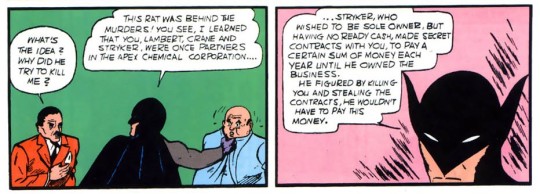
Paul Rogers visits the laboratory of Alfred Stryker, having learned of Lambert's death by news broadcast. Stryker's assistant Jennings clubs Rogers over the head and ties him up. Jennings explains that he will lower a gas chamber over Rogers and kill him the same way he puts animals to sleep. Jennings leaves to activate the gas. The Bat-Man leaps into the room through an open transom. The Bat-Man grabs a wrench and dives inside the gas chamber before it closes.
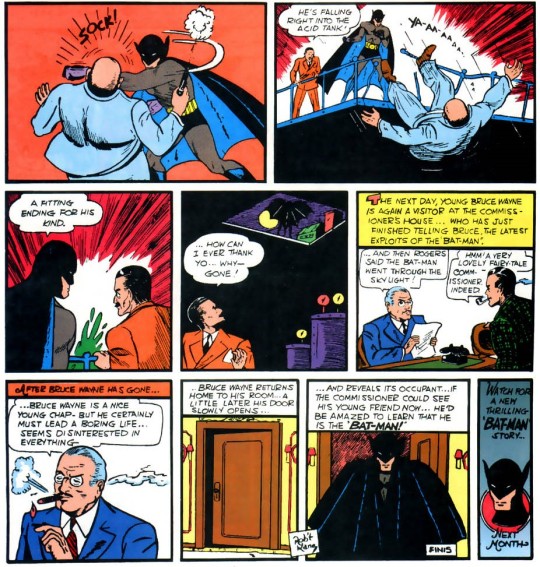
He plugs the gas jet with a handkerchief, and busts through the glass with his wrench. Jennings returns and tries to pull a gun on the Bat-Man, but the Bat-Man punches him in the face really hard. Alfred Stryker enters and demands to know what happened. When Rogers explains that Jennings tried to kill him, Stryker pulls out a knife to finish the job. The Bat-Man is hiding in the shadows, and he grabs Stryker from behind to stop him.
The Bat-Man explains to Rogers that they were all partners in the Apex Chemical Corporation. Stryker had made secret contracts with all of them to pay them a sum of money each year until he owned the business. He grew tired of waiting and decided to kill them so he wouldn't have to pay. Stryker breaks out of the Bat-Man's grip and pulls a gun on him. The Bat-Man punches Stryker so hard in the face that Stryker breaks through a railing and falls into a tank of acid. The Bat-Man remarks that this is a fitting end for his kind, and leaves via transom. Rogers tries to thank the Bat-Man, but he is already gone.
Later at his house, Commissioner Gordon relates this story to Bruce Wayne. Bruce remarks that this is a lovely fairy tale, and leaves. Gordon thinks to himself that Bruce Wayne is a nice young chap, but he seems to lead a very boring life. Bruce returns home to Wayne Manor, where it's revealed that he is in fact the Bat-Man.
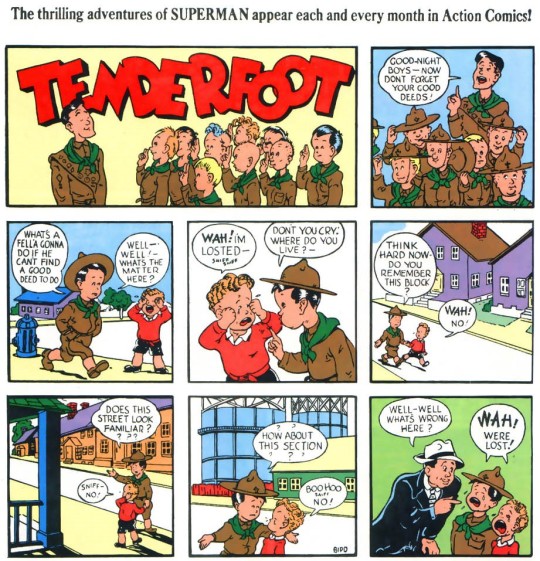
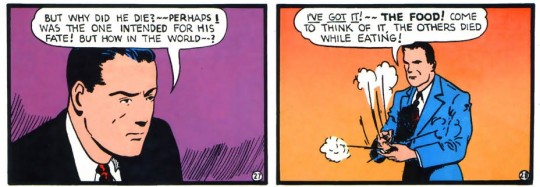
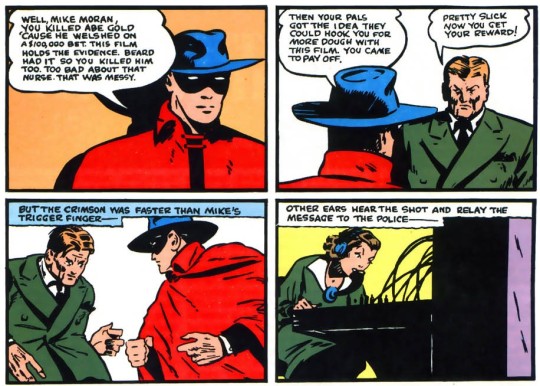
CONTEXT
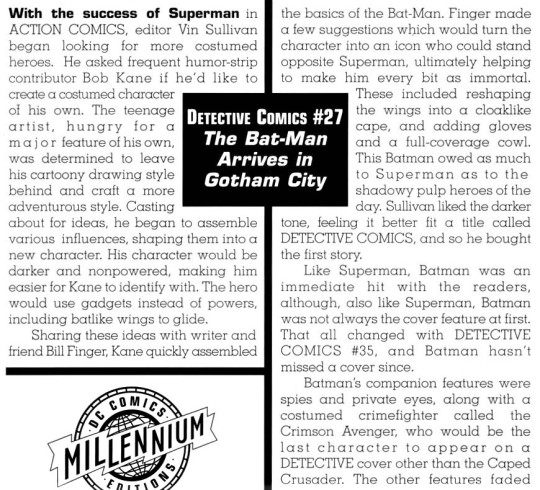

There is a lot of bad blood behind this creation, so stay with me and we shall go through this...
So the legend says that Bob Kane created Batman when he was a minor and with the help of writer Bill Finger they did the story that was published in Detective Comics. And that is just a legend.
It’s hard to tell if Kane was a minor when he signed his contract to National. He was born in 1915, and that would make him 20 at the time National/Wheeler-Nicholson started the business. We know for sure he wasn’t the “creator” of Batman.
Comics historian Ron Goulart has referred to Batman as the "creation of artist Bob Kane and writer Bill Finger". Bill Finger said this about Bob Kane:
Kane had an idea for a character called 'Batman', and he'd like me to see the drawings. I went over to Kane's, and he had drawn a character who looked very much like Superman with kind of ... reddish tights, I believe, with boots ... no gloves, no gauntlets ... with a small Domino Mask, swinging on a rope. He had two stiff wings that were sticking out, looking like bat wings. And under it was a big sign ... BATMAN.
Finger offered such suggestions as giving the character a cowl instead of the domino mask, a cape instead of wings, adding gloves, and removing the red sections from the original costume. He later said his suggestions were influenced by Lee Falk's popular The Phantom, a syndicated newspaper comic strip character with which Kane was familiar as well, Finger named the character Bruce Wayne after Robert Bruce the Scottish Patriot.
Bob Kane said (and I quote):
"Bill Finger was a contributing force on Batman right from the beginning... I made Batman a superhero-vigilante when I first created him. Bill turned him into a scientific detective."
Finger wrote both the initial script for Batman's debut in Detective Comics #27 (May 1939) and the character's second appearance, while Kane provided art. Artist Bob Kane negotiated a contract with National Comics, the future DC Comics, that signed away ownership of the character in exchange for, among other compensations, a mandatory byline on all Batman comics (and adaptations thereof). Finger's name, in contrast, does not appear as an official credit on Batman stories or films, even the comics he wrote in the 1940s and 1950s.
To make Bob Kane more of a controversial figure, when Jerry Siegel and Joe Shuster were looking for allies against the way National Comics was treating them, they went to Bob Kane, who betrayed them and at the same time re-negotiated his contract (as, like it was mentioned before, it wasn’t legal).
There is a documentary named “Batman & Bill”, that chronicles how Bill Finger created a legend and died penniless and forgotten, and how Finger's heirs, along with writer Marc Tyler Nobleman, finally righted this wrong. It also shines a light on the systemic injustices in Golden Age and Silver Age comics publishing, in which many other brilliant creators were shafted.
The documentary’s most compelling when it focuses on the relationship between Kane and Finger, two men who couldn't have been more different. Kane, who died in 1998, was a brash, boastful figure, one who saw his creation—and its popularity—as an extension of himself. A classic showman, he greeted fans wearing sharp suits or Bat-cowls, sold original oil paintings of Bats (which the documentary claims were painted by other artists), and wrote a grandiose autobiography. Even when he wasn't around fans, he preened; the documentary makes much of archival footage and audio recordings of Kane extolling his own genius. Bill Finger, on the other hand, obsessively researched weird facts, and kept a giant notebook full of scraps and notes that he could use in the next Batman comic—information gleaned from riding the bus for hours on end, staring out at the city and recording what he saw. Batman's tragic backstory sprang from his own dark imagination, as did most of the hero’s other defining traits, and even feverish gimmicks like having Batman fight on giant typewriters or dodge giant pennies. But that creativity came with isolation: He made only one appearance at a 1965 convention, and did almost no interviews.
So yes, these days DC found a loophole (I suppose) and even though they still add the byline of “Created by Bob Kane”, they modified it to “Created by Bob Kane with Bill Finger”. I understand this was agreed by the Kane estate.
I think this Ty Templeton comic pretty much encapsulates the Batman created by Bob Kane...

REVIEW
A small synopsis for the other features I am following here. Crimson Avenger is dealing with a mysterious gambling-related murder. Bart Regan is trying to prevent the assassination of all the partners in a company (almost like the Batman story). And Slam Bradley is looking for his federal agent friend who went missing in Switzerland.
Of course the main attraction here is Batman, but I should put some emphasis on how the other features are changing and getting a bit more serious.
The Batman story has been remade several times, so this is not my favorite version of it. However, it is amazing that so many details of the Batman we know today are there already. And it feels too obvious for us, but the reveal at the end that Bruce Wayne is Batman may have been a mind-blower at the time.
I could go on and on about the many things in Batman’s style, but there are too many sources you can check about those.
Happy 80th anniversary, Batman!
I give the stories a score of 8
#bob kane#batman80#batman#dc comics#national comics#dc#comics#review#1939#golden age#detective comics#slam bradley#spy#crimson avenger
7 notes
·
View notes
Text
Bi-Monthly Reading Round-Up: July/August
Playlist
“Mama Tried” by Merle Haggard (The Mars Room)
“Summer of Sam” by Lana del Rey (Sharp Objects)
“Keep Searchin’” by Del Shannon (Those Girls)
“No One Knows” by Dion and the Belmonts (Fortune’s Lady)
“Unpretty” by TLC (90s Bitch)
“Everybody’s Got the Right to Love” by the Supremes (Fool Me Twice)
“Loving Arms” by the Dixie Chicks (East)
“Spare Parts” by Bruce Springsteen (Joe College)
“You Said You Loved Me” from Bloody Blackbeard (Tomorrow and Forever)
“Hot in Herre” by Nelly (Miss Wonderful)
“Growin’ Up” by David Bowie (The Charm School)
“Somebody That I Used to Know” by Gotye (The Beggar Maid)
“Henry Lee” by Georgia Fireflies (Fairest)
Best of the Bi-Month
Sharp Objects by Gillian Flynn (2006): Troubled journalist Camille Preaker returns to her claustrophobic Missouri hometown to report on the brutal murders of two teenage girls. The gruesome nature of her assignment is only matched by the cruelty and senselessness that fills her childhood home. Flynn marries a beautifully constructed plot with a wealth of distressingly vivid details, and the result is unforgettable. It’s like if V.C. Andrews had cared about being a more conventionally “good” writer. (No disrespect meant to V.C. Andrews, who didn’t really need to be any better, but she very much did her own thing re: plot and style.) Also, I love Camille a lot.
Worst of the Bi-Month
Fairest by Marissa Meyer (2015): In this prequel to The Lunar Chronicles, Princess Levana leads a luxurious existence on the moon colony ruled by her family, but lives in fear of her sadistic sister and believes she can never be loved because of the terrible scars hidden beneath her glamor. Her desperation for affection and validation eventually turns her into the Evil Moon Queen of the series proper, or something like that. Levana is probably meant to be a lonely, misguided girl who slowly descends into evil due to a barrage of disappointments, or else a conscienceless rapist (yes, rapist) whose suffering renders her somewhat pitiable. I honestly can’t tell, but the result is incoherent, to say the least.
Rest of the Bi-Month
The Charm School by Susan Wiggs (1999): In 1850s Boston, painfully awkward spinster Isadora Peabody decides to leave her stifling, shallow family and work as a navigator/translator on a clipper ship, much to the frustration (at first!) of its raucous captain. This is a rollicking romance with a nice Old Hollywood feel, partly because it owes a lot to Now, Voyager. Isadora’s character development is engaging, and there’s some interesting social commentary about the damaging effects of being forced to perform femininity.
The Beggar Maid by Alice Munro (1977): In this collection of short stories, Rose grows up poor and unshielded from the sordid realities of her mid-century Canadian town. Education and marriage change her life almost beyond recognition, and then she changes it again of her own volition. Munro’s descriptions are so perfect that I barely ever had to make an effort to imagine what anything looked like, and her observations about people are uncomfortably accurate. The stories become a little too sedate in the last quarter of the collection, though.
Joe College by Tom Perrotta (2000): Working-class Yale student Danny, equally at sea with his carelessly rich classmates and hostile townie coworkers, runs into even more trouble during a spring break spent driving his father’s lunch truck. Although the story takes a while to get started, it features several terrific setpieces (notably a dinner hosted by a classmate’s personally charming, politically heartless father) and has a thought-provoking ending.
Fortune’s Lady by Patricia Gaffney (1989): In 1790s England, Cass Merlin’s father is hanged as a Jacobin traitor, leaving her disgraced and practically alone in the world. Recruited/blackmailed into acting as a honeypot for a suspected Jacobin ringleader, she doesn’t expect to fall for Philip Riordan, her fellow spy, but you know how these things go. This is probably my favorite of all the Old School romances I’ve read. It has a fun if overly lurid plot inspired by Notorious, a compelling if occasionally idiot-ball-carrying heroine, and a hero who is only occasionally terrible. On the other hand, the villain is a bisexual who hates Edmund Burke, which (a) is kind of offensive and (b) makes it really hard for me, a bisexual who hates Edmund Burke, to hate him.
The Mars Room by Rachel Kushner (2018): Romy, a single mother and stripper from San Francisco, ends up serving two consecutive life sentences in maximum security prison after killing her stalker. This novel pissed me the fuck off, not because it’s bad, but because it showcases the blatant unfairness of the justice system for indigent defendants and the proudly heartless attitude that many people have towards prisoners. Kushner has a terrific style and makes lots of references to 1960s country music, which I appreciate, but she loses steam about two-thirds into the book.
90s Bitch by Allison Yarrow (2018): Pushing back against the wave of nineties nostalgia, Yarrow details the sexism rampant in the decade’s politics and media, covering topics like the Clarence Thomas sexual harassment controversy, the downfall of Tonya Harding, Dan Quayle’s war on Murphy Brown, and the watered-down feminism of the Spice Girls. Yarrow’s account is entertaining as the subject matter is infuriating, but I wish she’d spent more time establishing how the eighties were any less sexist, because that doesn’t sound quite right.
East by Edith Pattou (2003): Ebba-Rose grows up happy with her large family on their early modern Norwegian farm, until poverty, illness, and the exposure of a big lie threaten to end it all. Then a polar bear shows up at the door and offers to fix everything in return for Rose coming to live with him--an offer that Rose feels compelled to take not just out of desperation, but out of wanderlust. I’m not that familiar with “East of the Sun, West of the Moon,” but this seems to be a fairly straightforward retelling. It’s charming, though, and it really picks up after the candle incident.
Miss Wonderful by Loretta Chase (2004): Threatened with financial consequences if he doesn’t marry an heiress within a year, Napoleonic war veteran Alistair Carsington says “fuck that” and goes into the canal-building business with a friend in order to come up with the necessary cash. However, going into the canal business brings him into contact with the bewitching Mirabel Oldridge, who fucking hates the idea of a canal running through her village. This Regency romance turned out to be a lot sadder than I thought it would be--the hero and heroine spend just as much time dealing with PTSD and grief for a parent, respectively, as they do bantering--and it was a richer story for all of that. The start was pretty slow, though, and I could’ve done without the disdain for the lower class.
Fool Me Twice by Meredith Duran (2014): Desperate for safety, Olivia Holladay cons her way into a housekeeping position at the Duke of Marwick’s house, hoping to find letters that will keep her murderous stalker off her back forever. Then she becomes way too invested in the welfare of the duke, who has become agoraphobic and borderline feral after his wife’s sudden death. This Victorian romance had an even slower start than Miss Wonderful, and I never got a coherent sense of the heroine’s personality; she’s a combination of prim goody-goody and wily con artist, and those two sides never really gel. I did like the conclusion, and Duran’s style is excellent as ever.
Tomorrow and Forever by Maud B. Johnson (1980): Tricked into boarding a bride ship and brutalized by Blackbeard’s pirates, New England girl Marley Lancaster finally finds love with Captain Bates Hagen after they’re set adrift in a dinghy together. They start a new life in Bath, North Carolina, but can it survive the fact that Bates is kind of a dirtbag? I rather enjoyed this Old School romance, partly because of the unusual setting and partly because I just liked the heroine. She’s kind of weak-willed and not very good at solving problems, but she struggles through life anyway and I really rooted for her. Bates, for his part, is...not a rapist. He’s actually the least rapey man in the story, which is how it should be, right? Still, he’s a dirtbag who ditches his common-law wife in a hostile colonial town and seems affronted when she doesn’t stay put. Plus I feel like only half the rapes in the story were narratively necessary.
Those Girls by Chevy Stevens (2015): Three sisters flee their rural Canadian home after the youngest kills their abusive father, only to face more horrible violence from men. Years later, after they’ve started a new life in Vancouver, the past reemerges and, you guessed it, there is more horrible violence. I finished this book and asked myself, “Is a woman made to suffer?” Like, I obviously read a lot about women suffering (see: most of this list), but this whole story is just women suffering, briefly trying to get revenge, and suffering more because of the revenge.
4 notes
·
View notes
Text
Revealed: Disabled Marine Shows Men Over 40 How To Eliminate Weakness And Build Combat Ready Conditioning At Any Age…
New Post has been published on https://click.atak.co/revealed-disabled-marine-shows-men-over-40-how-to-eliminate-weakness-and-build-combat-ready-conditioning-at-any-age/
Revealed: Disabled Marine Shows Men Over 40 How To Eliminate Weakness And Build Combat Ready Conditioning At Any Age…
Product Name: Revealed: Disabled Marine Shows Men Over 40 How To Eliminate Weakness And Build Combat Ready Conditioning At Any Age…
Click here to get Revealed: Disabled Marine Shows Men Over 40 How To Eliminate Weakness And Build Combat Ready Conditioning At Any Age… at discounted price while it’s still available…
All orders are protected by SSL encryption – the highest industry standard for online security from trusted vendors.
Revealed: Disabled Marine Shows Men Over 40 How To Eliminate Weakness And Build Combat Ready Conditioning At Any Age… is backed with a 60 Day No Questions Asked Money Back Guarantee. If within the first 60 days of receipt you are not satisfied with Wake Up Lean™, you can request a refund by sending an email to the address given inside the product and we will immediately refund your entire purchase price, with no questions asked.
Description:
If you want to strip off excess body fat and build impressive levels of endurance while rewiring your muscles with the kind of primal power and control that repairs joints and prevents injury…
This letter will show you how one Disabled Marine did it…
And how you can do it too, without any fancy equipment, and in less time than you might imagine.
Hi, my name is Helder Gomes. And I’m a Service-Connected Disabled Veteran. Yet you’d never guess it from watching me train.
In fact, some of my clients call me “The Super Soldier”.
I try not to let it go to my head. But secretly, I kind of like it.
Imagine being told your body will never be able to do what it used to. Not even come close. And that you’ll have to settle for a life of “soft, weak and tired”.
Then imagine the looks on their faces when you not only prove them wrong, but suddenly…
When the odds are stacked against you, you can’t help but bathe in victory just a little.
Super Soldier? That’s an Army thing. But, yeah… I’ll take it.
Anyway, what does this have to do with you?
I want to give you my “super soldier serum”.
If you’re willing to put it to the test, I believe it will change the way you train forever.
And when put to work, these “machines” will prove — beyond a shadow of a doubt — your body’s best years are yet to come.
This underscores an important point…
See, you don’t need expensive gym memberships, functional training “circus tricks”, or puke-inducing workouts to gain an advantage over other men.
No. With what I’m about to reveal, you can unlock the hidden power in even the most basic exercises to revitalize your body and build high levels of fitness… with less reps, and no matter your age.
You’ll unleash a level of inner strength and confidence you may not know you possess right now… even if It’s buried beneath years of wear and tear.
So, if you suspect you’ve stumbled onto something unlike anything you’ll ever hear about from your average clipboard-toting trainer, you’re right. In fact…
What you are about to discover is the same secret training method I’ve taught to some of…
These are some of the scariest dudes you’ll ever lay eyes on… who have high fitness standards to meet for their jobs, but can’t afford to be fatigued and sore all the time.
I’m talking about members of the leanest and meanest fighting groups in South America and Eastern Europe…
Special Operations Units in the Middle East…
And First Responders, fellow Devil Dogs and former Navy Seals back in the States.
They have the resources to train in any discipline they’d like. And yet, time and again they contract me out for days (to weeks) at a clip to pace them through my system.
Why? One dead-serious reason: they need one of the good guys to expose and eliminate their weaknesses before the “enemy” does.
It’s kind of crazy when you think about it…
You throw out all the “rules” that Average Fitness Joes live by.
Let me give you some perspective…
See, when your body starts falling apart you’re slower to get going in the morning… fighting more aches and pains throughout the day… setbacks come more frequently, and motivation to exercise gets harder and harder to come by.
It’s nearly impossible to stick to a program when you feel beat up and blue all the time.
Worst part is, this screws with your hormones, eating away at lean muscle mass, and packing fat around your midsection and sag around your chest.
I was headed down that path.
Take a look at this picture…
Just don’t be fooled by the smile, because…
First, my wife isn’t hugging me; she’s holding me up. That’s why we’re standing so far apart.
Second, I’m covered in sunscreen and shame. And only one of them was going to wash off.
Third, I’ve lost all sense of purpose in my life.
The Marines had long since classified me no longer “fit to serve”. I’d fallen from bad-ass to fat-ass. I was just waiting for the day my wife could no longer stand the sight of me and finally wise up and hit the bricks in search of a real man. And I saw nothing but darkness in my future.
I remember sitting there not too long after this photo was taken. Just staring at it. Thinking, “Man, what a certified piece of dogshit you’ve become.”
I couldn’t get through a night without waking up in a cold sweat. Couldn’t put on a shirt without feeling like my shoulder was being ripped out of the socket. I couldn’t even make it from my bedroom to the bathroom on my own two feet, most days.
I cringed at the thought of being the dad that has to sit back and watch as some other guy teaches his kid how to play sports, or how to defend himself, or how to be an honorable man.
Why am I telling you all this? Not for your pity. But, because it’s important you know where I’m coming from if my advice is going to mean anything to you (even if that means being transparent to the point of risking embarrassment). Anyway, it should be obvious that…
And it wasn’t for lack of trying either. I’d easily drop money I didn’t really have on books and dvds and trainers. But, even beginner or “easy” workouts turned out to be anything but. In fact…
A lot of it was actually doing me more harm than good.
Most programs seemed to be created for young, able bodies. And most trainers didn’t know what to do with a body that had limitations.
So just about anything I put my body through left me regretting it the next morning.
And the doctors? Their only answer for my shoulder was: “Try not to lift your arm too high”. Their solution for my knee was to stitch in parts from a dead man to replace the parts that were missing; and even then I was told I’d still never walk in total comfort…
They told me to take it easy.
And that “acceptance” was the first step towards happiness.
And a bunch of other head-shrink stuff. Well…
They obviously didn’t know who they were talking to.
Because, able-bodied or not…
No one could give me answers, so…
I went out and found them on my own.
I knew I needed to take my research “off-grid”, and…
…on the darker corners of the fitness and human performance world that I’d spend my days and nights.
And guess what I discovered?
At an unconventional strength seminar I tracked down a bear of a man known as “The Crazy Russian”… who exposed me to weird “mental tricks” to elevating your strength simply by changing the way you THINK about how your muscles move your body…
I studied somatic exercise and other therapeutic modalities… looking for secrets to rejuvenating a body that’s
stopped responding to exercise the way it used to.
I even ran into this “off-the-wall” body worker who believed most personal trainers should be charged with gross negligence — if not physical abuse — for much of what they subject their clients to. But…
And hesitant as I was, I even threw myself into the martial arts… in hopes of uncovering how some of these guys keep kicking ass well into old age. And to my shock…
Punching arts, kicking arts, grappling arts… knife, stick and weapons fighting… all of them… had a very real “magic” of internal power and body control that…
This is just the tip of the iceberg.
Once I dove headlong into the rabbit hole, I found myself mixed up in some controversial exercise theories and strange body disciplines.
The kind of stuff you almost never hear about in the magazines or mainstream media. This is why…
Look, as a guy who was once a complete and total mess, I can tell you I’m pretty darn vigilant about what I subject my body to. So when I started experimenting with all the secrets I was digging up, I kept close track of how my body responded. And guess what?
But it gets better because…
I started doing things with my body that not only shocked the hell out of the doctors who told me my best days were behind me… but gave my “glory days” a run for their money.
Imagine their surprise when I ran the New York City Marathon.
Or when they saw videos of me tossing around kettlebells like they were softballs.
Or when they heard I was rolling around on the mat with champion martial artists.
Best of all, my friends and family were now looking at me with a newfound sense of pride and respect, instead of doubt and pity.
And it wasn’t long before guys started talking…
…and word spread through back channels and I was getting cryptic messages from some dangerous dudes who wanted a peak behind the curtain.
They wouldn’t take no for an answer. And yet…
When I started letting them in on it, they couldn’t believe the simplicity. But I told them…
After years of putting countless moves, methods and strategies under a microscope, I discovered the most powerful secrets all had one thing in common:
Well, the first step of this is a simple mental shift.
That’s because you can’t separate your muscles from your nervous system (not unless your a dead man). No…
The key in this first step is simply understanding that your nervous system CONTROLS your muscles. Like a puppet master, it’s pulling your muscles strings. And it dictates what they do and how they feel.
In other words, it determines your strength, flexibility and pain. In ways that most guys are normally NOT aware of.
Anyway, the second part of this is to…
You can think of it like the difference between hammering the gas for more acceleration, and fine-tuning your engine for greater horsepower.
This is why I named my secret training system the Precision Fitness Operator System (PFO-Sys for short).
See, I figured out there are three “Power Principles” that separate Average Fitness Joes (AFJs) from Precision Fitness Operators (PFOs)…
…and allow you to train like the puppet master, instead of the puppet… so you can eliminate weakness and build combat ready conditioning at any age.
They understand that your mind drives your movement. Not in some airy-fairy “woo woo” sense. The science is clear on this. So much so that studies have shown your brain can regulate force production without you ever having to move a muscle.
This is why mental imagery can cause strength gains, it’s also why certain lower body exercises can increase the strength of your upper body, or why stretching one limb can increase the flexibility of another (unstretched) limb. So…
While AFJs train their muscles, PFOs sharpen their neural drive, and train their brain to send stronger, clearer signals to their muscles, which translates to more muscle engagement by recruiting more muscle fibers (or getting the fibers to work more quickly and efficiently).
This “reprograms” your nervous system so it activates the right muscle fibers with greater precision… granting you better muscle contraction/relaxation balance… and developing a primal strength and control that AFJs may never know…
They understand that “unified movement” makes every exercise safer, more efficient and more powerful. Don’t misunderstand me. This isn’t about “whole body” versus “isolation” training. Think of it this way…
Every good fighter pilot runs through a pre-flight checklist, eyes and flips a bunch of switches before his mission is a “go” and we have lift off. Well, PFOs do something similar with their joints, breathing, muscle engagement and form before cranking out reps.
More, they know flipping the right “switches” on and off as you move through an exercise can be the difference between a “ok” rep and a power rep.
AFJs train “harder” than they need to because they leak power. PFOs get more done with less time spent training simply by plugging their structural leaks.
By not leaking power, they prime their body to take advantage its natural, spring-like ability to load, absorb and redirect “shock”… keeping the pump on their muscles, and the pounding off their joints… smoothing out their movements so they’re less taxing on your body, but deliver more powerful results at the same time.
They understand the real measure of a man’s fitness is his ability to “keep it together” under extreme pressure. And, more important, older PFOs understand there’s a thin red line between your comfort zone and the danger zone. See…
Contrary to popular belief, pain is not weakness leaving the body… meaning “no pain, no gain” is a mantra of diminishing returns… and… stepping outside your comfort zone can often lead your body to protest and work against you.
This is why PFOs never train to muscular failure. That’s an AFJ approach, and it can lead to some nice mass gains. But, it can also lead to repetitive strain syndrome, tendon flare ups, chronic soreness, aches and pains… and fractured technique, exposing weakness. Instead…
PFOs train to technical failure. They know that, in the field, technical failure can be the difference between life and death. And their training reflects that.
By shooting for technical failure (and never missing their mark) under incrementally increasing pressure, PFOs avoid entering the “danger zone”, instead expanding their comfort zone from the inside out. Studies show this is an easier and less tiring way of increasing strength and functional capacity of your muscles, and therefore a highly efficient method of training.
These three Power Principles are so simple, yet so game-changing, that any guy can use them to turn even the most ordinary exercises into body re-building machines…
And yet, it’s easy to apply these principles the wrong way… because, quite often, applying them the RIGHT way requires LESS effort, LESS speed, LESS intensity than you might imagine.
This is something most guys have a hard time wrapping their head around. And a hard time nailing down on their own after spending so much time in an AFJ kind of world.
Which is why I believe my Precision Fitness Operator System is so valuable.
It’s proof positive that…
Making the simple shift from Average Fitness Joe to Precision Fitness Operator with PFO-Sys:
Saving your body undue wear and tear… IF that’s what you want.
Anyway, there’s a good reason for you to be excited about all of this. You see, for years the only way to learn PFO-Sys was to contract me out privately… and it never came cheap. In fact…
Because Fight Camps and Spec Ops Units usually booked me solid.
These were often several days, to multiple week-long contracts costing thousands of dollars in billable hours, plus comped travel expenses, room and board.
And being a Vet, Professional Warriors always got priority over Civis. So the little downtime I had for teaching locally was extremely exclusive.
See, recently a publishing house warmed me over to the widespread demand for something like this. Turns out the head honcho over there is a total badass… a real life Ninja.
With extensive studies in Bujinkan and other martial and fitness disciplines he travels the world as a writer and anthropologist…
…digging up some of the most effective health secrets known to man and sharing them with his readers.
With his kind of reach, I could connect with more guys than ever possible through private contracts alone. Obviously, that has economic and logistic benefit. Or so he tells me.
Which is why I’ve made a publishing deal: we could test this low cost offer in a few places, and if it does well we keep it on the market and go wide with it. If it doesn’t however…
That means, if you’re reading this message, the deal is still on. For now.
This is an unbelievably exciting package… designed you so don’t risk a single cent putting it to the test in your own home.
Here’s exactly what I’m giving you today:
It’s called the Warrior Zero Bodyweight Challenge. Check it out…
On my computer I have a “classified” folder named The Warrior Zero Project. It contains all of my research, tests, experiments and “top secret” programming.
The name stems from an attitude of self-reliance and survival… paired with an acknowledgment that the best comebacks start from ground zero.
Anyway, the heartbeat of every single piece of body re-building, combat conditioning advice in The Warrior Zero project is my Precision Fitness Operator System. And…
The foundation (and critical starting point) for learning, owning and mastering PFO-Sys is the Warrior Zero Bodyweight Challenge. And that’s what you’re getting your hands on today:
This is a PFOs bible… and now, it’s yours. Inside you’ll discover:
Most fitness gurus think it’s the WORST exercise in the world. Yet recent research confirms it may be the single most effective exercise to increase life expectancy. Plus…
Ask any Elite Operator, and they will tell you this exercise is MISSION CRITICAL.
The “Go-Muscle” secret of developing kinetic chains. (Bodybuilding athletes miss this critical training factor and suffer for it when called upon to use their “muscle” in the real world.)
The controversial power of “single rep cycling”. Ultimately, this will allow you to get more out of every workout, with less reps and without beating your body to shit.
— How to scale your training — safely and naturally — by deploying the same secret “symmetry” code Leonardo da Vinci used to create a perfectly balanced human in his famous Illustration “The Vitruvian Man”. (Ancient Greeks and Egyptians used it to design perfectly balanced works of structural art, and Bio-Mathematicians are now confirming this secret symmetry is encoded in living matter everywhere.)
— 3 “PFO Mission” Challenges. There are several weeks between challenges. And you can think of the weeks leading up to each challenge like reconnaissance — everything you’re doing is to put your mind and body in the best position to complete your Mission with flying colors. More…
You’ll know, in real time, whether or not you’re ready to “level up” or whether or not you’ve got a little more work to do before pushing your body beyond its limits and out into the danger zone.
This challenge system is a fire starter for guys who lack the motivation to stick to a training program.
And a whole bunch more…
These videos aren’t simple demonstrations the likes you’ll find on blogs or Youtube. They present a measured, “precision” approach to exercise that reveal:
Force transfer secrets… posture and alignment tricks… the overlooked power of ground reaction forces… selective tension… AND…
Why 99% of all Average Fitness Joes totally miss the boat when it comes to “ab” training.
3 priming switches all PFOs flip before each workout to make sure all systems are “go” for maximum gains. (Plus, one common switch AFJs flip that undermines the power in all their movements.)
The secret to freeing up a tight back almost instantly. (Sheds rust and stiffness — within minutes you’ll suddenly feel lighter and more energized than you might believe.)
The truth behind your body’s “linchpin joint”. (And why a simple positioning tweak can double — even triple — the power of every exercise you perform.)
The #1 exercise mistake Average Fitness Joes make that wreaks havoc on their knees.
The ultimate lazy guy’s exercise for strengthening muscles weakened and shut down by chronic sitting. (Plus, one simple adjustment to this drill that electrifies your core more than any set of sit ups and crunches will ever do.)
A seated movement that exposes “asymmetrical deficiencies” in your hips with just one rep. (These deficiencies are often the true source of a muscle ache or joint pain.)
How to get more mobility from any movement by changing the way you breath.
The vital coaching cues you can get from an inanimate household object that most clipboard-toting trainers will never tell you about. (And how it can correct dangerous — and painful — structural leaks within seconds.)
The Hollywood “Walk of Fame” secret to unlocking fully integrated, pressing power.
How to use the three-legged table test to determine whether or not your TRULY ready (and safe) to progress out to harder and harder pressing movements. (If there’s any “wiggle-wobble” here you know with 100% certainty you’ve got more work to do before moving any further.)
Why your shoulders determine the proper depth of push up for your body type. (And when chest-kissing the ground can set you up for a setback.)
A special 3-second, 3-point mental “checklist” for correcting your posture on the fly. (This is like hitting the reset button on your posture so that you maintain a safe, but powerful “exercise frame”, even when you’re bent over.)
A cadence secret most military guys know (instinctively) that helps your body draw power up from the ground, absorb and redirect shock like a spring.
The ancient “tribal trick” that accelerates your learning. (For many guys this is also a “short cut” to healthy knees, hips and lower back.)
The one “ab” exercise that melts away tension across your entire spine and strengthens your core in a way no plank could ever do. (Takes years off your body in just minutes a day.)
A sneaky little “recovery accelerator” technique. Deploy this post-workout to abate soreness, stiffness and restore muscle balance in a few short minutes.)
And many more PFO secrets that you’ve really got to feel to believe…
It’s like having me in the room with you, right by your side. I’ll coach you along with my student, Frank, as we move through each workout in real time.
You’ll quickly realize this isn’t BUD/S or some hardcore body-wrecking bootcamp insanity.
Instead, you’ll learn to use your body’s natural ability to load, absorb and redirect shock…
Turning simple movements into body-rebuilding machines and peak-performance-powerhouses…
While reinforcing your joints (saving them wear and tear)… and allowing your muscles to recover while in motion.
This keeps your muscles fresher longer… your metabolic fire churning… and your body operating as a single integrated unit.
Because I want to help you stack the odds of success even more in your favor…
Breathing is something you are always doing, whether you are paying attention to it or not.
Yet, learning how to pay better attention to and control your breath is an overlooked “nervous system hack” that can provide more powerful workouts, faster recovery, shots of instant energy and a wave of general stress relief.
Here’s some of what you’ll discover inside this module:
The one thing almost every new student does WRONG with their breathing during exercise that undermines their performance and increases risk of injury (plus an easy fix)…
A type of breathing that enhances the benefits of any exercises (bonus: it also helps rid the body of toxins, which can lead to faster weight loss)…
How to use your breathing to guide your training progress — instead of using reps, sets, resistance, or time (this is a wise alternative for anyone suffering exercise-induced pain)
How to use “geometric” breathing to expand your lung capacity and control your heart rate — this is especially important for resuming command of body functions when fear and stress stage a “military takeover”.
The ancient breathing technique that increases your antioxidant defense status (and combats oxidative stress) after hard training…
It also reduces the “fight-or-flight” response of the parasympathetic nervous system and could enhance vagal activity (which can reduce anxiety, anger, and inflammation)
A special kind of “explosive” breathing that energizes your entire body almost instantly… leaves you feeling amped, alert, and ready to tackle your workout.
How many times have you just wanted to throw in the towel and rattle off excuse after excuse as to why something can’t get done?
We’ve all been there. Yet there are times when if you do not accomplish the task at hand, it does not get done.
Getting your body into shape is one of those times. But, make no mistake… developing intestinal fortitude isn’t just about trying to be a “tough guy”.
Your Warrior Zero Intestinal Fortitude module goes beyond “gut checks”. I’m not simply barking orders at you to “pick your sack up and keep moving…”
No. It’s more than that.
Intestinal Fortitude is about developing the kind of situational awareness and “streets smarts” that not only develops toughness, but wisdom.
Which is why, in Warrior Zero Intestinal Fortitude I’m going to reveal 10 things I learned in the Marines that are guaranteed to make you a better man.
You’ll learn about the mental toughness Marines are known for, and the physical endurances it helps them push through. Plus, you’ll discover:
Insights on Overcoming Adversity… How to develop Unshakeable Self-Confidence… How to Control Fear, Stress & Anxiety… The Ultimate Guide To Self Discipline… How To Harness the Power of Positive Self-Talk… and more…
I think you’ll really enjoy this module.
You’ve got enough to focus on with your Warrior Zero Bodyweight Challenge. You don’t need a bunch of restrictive diet rules to follow.
That’s why, your Warrior Zero Supportive Nutrition module is based on 10 PFO “Fueling Principles”.
Much like the PFO “Power Principles” that guide your workouts, these Fueling Principles give you the flexibility required to make eating for your health feel NORMAL…
…and not like some crazed fitness freak.
You’ll quickly get your head straight about eating clean and making the right food choices for reducing body inflammation, fueling your workouts, and aiding your recovery.
This is NOT a diet. But a set of principles you can apply to your lifestyle, no matter how busy your day is, or selective your taste buds.
Now, I’m going to tell you what this costs and how to secure your own copy in just a second. But, first we need to get very, very clear on something:
In fact, there are some guys I hope never find out about it. No joke.
This stuff isn’t for hot-headed, young bucks who think an “old dog” can’t teach them a few new tricks…
…or for the kind of guy whose endgame is being surrounded by gym-bros strutting around stiffly with inflated, puffy muscle, a dumbbell in one hand and a cell phone in the other…
…or even the kind of blood-pressure-popping psycho who would rather die under the bar than dump out of a rep.
So, I’m telling you now — don’t even think about trying this program unless:
1) You are serious about eliminating weakness and building combat-ready-conditioning at any age… and want an advantage over other men… so you can step up to the plate and be the man you’re needed to be…
2) You are willing to slow down and shift your focus from training like an Average Fitness Joe to training like a Precision Fitness Operator… so you can reprogram your nervous system and rewire your muscles for an almost unbelievable primal control and power… without killing yourself in the gym…
3) You are sick and tired of feeling soft, out of shape and always doubting yourself… sick and tired of workouts that make you feel like something is wrong with you… or simply sick and tired of watching other guys do the things you should be doing… but no longer can.
Still with me? Good. I’m damn proud of Warrior Zero and this outstanding package I’ve been able to put together for you on this page.
Given the chance, you’ll find it’s got more integrity and value than what you’ve probably come to expect from most things in the fitness world.
You’re getting EXACTLY what I teach all around the world. Not some watered down “lite” version of my system. But…
And you need to know this before you make your decision. See, this isn’t some put-on Hollywood production… with slick stage design and hired guns who model for a living to huff and puff half naked on screen. No.
You’re getting quality video instructionals and follow alongs, filmed in HD, in my private headquarters. It’s me and one of my actual students walking you through every last detail of how to train like a Precision Fitness Operator.
I’m also delivering everything to you digitally, so don’t expect a big brown box on your doorstep.
I’m doing this for two reasons: 1) this allows me to offer this special Warrior Zero package to you at a much lower price, since there are no shipping and manufacturing costs and… 2) this gives you the convenience of reading and watching the material at home and on the go, via smart tv, desktop, tablet and phone.
If you can get past these “flaws”, you’re good to go, because…
Look, a lot of guys are going to be miffed at me for sharing this secret training system with you… especially since you won’t be paying even part of what they had to shell out for even a single lesson.
But, it is what it is. I’ve come to realize just how many guys desperately need an alternative to the type of fitness the mainstream is trying to force-feed them.
They’ve spent too much time and money on gimmicks and false promises to justify spending even a dollar on something new… even if it’s a simple system that will change their lives. I get it.
Listen, I’m a Marine and an Eagle Scout, and I stake my reputation on my promises.
Perhaps, more important, I’m just a guy about to eclipse 50 with a body that’s been through the wringer — and I honestly want to share this incredible new program with you, and I don’t want you to worry about getting scammed or “taken for a ride” or anything like that.
It’s hard enough to find someone you can trust in general, even more so on the internet. The least I could do is make it as easy as possible for you to try it out, without any risk. Right?
Click the ‘add to cart’ button below, fill out and submit the secure order form on the next page and you get instant access to everything with your own personal account on my private server.
This price wouldn’t even buy you fifteen minutes of private time with me at my regular coaching fees. Yet for less than the price of dinner and a movie, you can own my training system for yourself… with this Warrior Zero package that reveals to you everything you’d learn in private sessions.
And you know what? I’m so confident you’ll see impressive results that I’ll put ALL the risk on myself with a 100% unconditional, money back your-prerogative-guarantee:
Here’s how it works: Order your personal copy of the Warrior Zero Bodyweight Challenge. Download all of the manuals and videos, or stream them from any of your devices, whichever you prefer.
Put the secrets you’ll find inside to the test.
Take a full 60 days, if you want.
This way you’re not rushed, and don’t have to worry about life getting in the way, or any other excuses guys make for themselves when facing a new challenge…
Notice the difference you feel in your muscles and joints as you’re training like a Precision Fitness Operator.
Notice the fit of your clothes now… the difference in the way you start to carry yourself, and the way the people around you respond… and take a good, long look at the new man you see staring back at you in the mirror.
If you decide at any point that you’d like to go back to training like an Average Fitness Joe, give up your physical advantage over other men, and settle for anything less than your body’s best…
Simply shoot an email over to [email protected] and let me know. I’ll have customer care process your 100% guaranteed refund straight away. No hassle whatsoever. Your prerogative. It’s your body and I trust your judgement here.
And, you get to KEEP anything and everything you’ve downloaded. Consider it a gift for giving the Warrior Zero Bodyweight Challenge a “test drive”.
So now all that’s left is to ask yourself one final question…
Maybe you want to be more attractive to your wife… instead of looking (and feeling) like a crippled old man…
Maybe you want to build the kind of endurance and all-day-energy that makes it feel like your body is running on rocket fuel…
Maybe you simply want to build (and maintain) outstanding levels of conditioning and develop real muscular power and control with less time working out and without pounding your joints…
Only you know that. But, what I do know is, to a man — everyone of them who has become a part of The Warrior Zero Project — has never looked at fitness the same way again, and is a better man for it.
Remember: no matter what anyone says, you ALWAYS have a lot more fight left in you.
Here’s to proving them wrong.
I hope to see you on the other side, and look forward to hearing about your success.
Helder Gomes
— United States Marine,
International Combat Instructor,
Head Coach NTC-HQ
WARNING: other guys might start asking you for advice when you train out in public. That’s ok. It’s a natural side effect of training like a Precision Fitness Operator. Embrace it. These guys, no matter how young or old, are ready for a paradigm shift. And they’re in need of a good, honorable man to lead them. Be that leader. Give them a few point pointers, if only the 3 “Power Principles” you’ve learned in this report. Then send them off in the right direction, and on the path to proving all their naysayers wrong and proving to themselves it is possible to eliminate weakness and build combat-ready conditioning at any age…
Siddle, Bruce. Sharpening the Warriors Edge: The Psychology & Science of Training. PPCT Research Publications. 1995.
Asken, Michael, and Christensen, Loren, and Grossman, Dave. Warrior Mindset. Human Factor Research Group. 2010.
Grossman, Dave, and Christensen, Loren. On Combat: The Psychology and Physiology of Deadly Conflict in War and in Peace. Warrior Science Publications. 2008.
ClickBank is the retailer of products on this site. CLICKBANK® is a registered trademark of Click Sales Inc., a Delaware corporation located at 1444 S. Entertainment Ave., Suite 410 Boise, ID 83709, USA and used by permission. ClickBank’s role as retailer does not constitute an endorsement, approval or review of these products or any claim, statement or opinion used in promotion of these products.
Copyright 2018 thewarriorzeroproject.com · All rights reserved.
For any questions, please contact us here at [email protected]
Our entire Privacy Policy & Terms & Conditions
Click here to get Revealed: Disabled Marine Shows Men Over 40 How To Eliminate Weakness And Build Combat Ready Conditioning At Any Age… at discounted price while it’s still available…
All orders are protected by SSL encryption – the highest industry standard for online security from trusted vendors.
Revealed: Disabled Marine Shows Men Over 40 How To Eliminate Weakness And Build Combat Ready Conditioning At Any Age… is backed with a 60 Day No Questions Asked Money Back Guarantee. If within the first 60 days of receipt you are not satisfied with Wake Up Lean™, you can request a refund by sending an email to the address given inside the product and we will immediately refund your entire purchase price, with no questions asked.
2 notes
·
View notes
Text
I didn’t bury the lead. Steve Dikto, one of the foundations of the current Marvel Universe, a forgotten titan, a master of magic, a spinner of webs, with vision as far as the eye could see, has past beyond Eternity’s reach. Steve left us at the age of 90.
Not much to tell you don’t already know, so I am going to tell you a story you don’t know: the strange story about my rediscovery of Steve Ditko.
Ditko’s Spider-Man
The Universe didn’t want this story told. On the day I got the assignment, I was driving (I am an Uber driver sometimes, so my epiphanies often happen behind the wheel) and I talked to my boss, I had a whole lot of ideas of what I wanted to talk about.
Steve Kitko
Steve is relatively unknown to most of the modern readers of comics, unless they have managed to stumble across a copy of Strange Tales withering in a basement somewhere, Ditko’s name is rarely invoked, even while people consume the timeless quality of his creativity without ever knowing it.
The fact is that many of Marvel’s early creators such as Dikto created work-for-hire, and as such anything they created for Marvel back then meant it belonged to Marvel and the creator would never know any further income from the work, no matter how it was transformed, revised, expanded, or turned into a blockbusting movie making billions and billions and billions of dollars.
That those creators are usually never compensated again, no matter how much money gets made, is wrong. So many of these early creators, these unsung heroes, who created something which became fabulous, would still die broke, without even the most basic amenities of life, while executives who lack the creativity of plaster of Paris, rake in the billions from their exploitation of greater minds.
I understood how such exploitation get done. I know it’s pure greed. But most importantly, I realized it was the secretly the death knell for the Big Two’s creativity.
You see, people like Steve Ditko created because they loved doing it. He created freely, with the hope that his creations would live independently of him. Steve’s creativity was the kind of thing which didn’t just appear or simply exist.
Steve’s designs inspired — when they didn’t mock, or when there wasn’t a secondary meaning in something he created. Steve was a layers kind of creator. In his portrayal of Spider-Man’s foes, he brought to life, the Everyman villain — not a mastermind, sometimes a genius, sometimes a dufus. Usually just that guy up the street, late with his rent. Electro was Max Dillon, electrical worker. Just a regular Joe.
Steve’s signature design on Spider-Man’s costume has morphed over the ages, but has rarely been improved upon. And even all these years later, Spidey’s red and blue has remained as iconic as many other Ditko’s designs.
And this leads me to the crux of the problem.
When creators like Ditko are taken for granted, when they are not seen as the visionaries they are, they wither. They revert into themselves. They lose the faith. They falter. Sometimes they get back up, wading back into the battle. But if they are too far ahead of their time, with ideas too strange for the world they live in, they are mistaken for kooks, birds too unusual to be around.
Steve Ditko was such a fellow. Creative to a fault, his iconic works survived his relatively brief stint at Marvel. Spider-Man’s classic costume, the immortalized cape, costume and accoutrement of the magnificent Doctor Strange.
He would create a number of Spider-Man’s most iconic rogues, foes who would appear again and again, as famous in their way as Spider-Man: The Vulture, Dr. Otto Octavius, Sandman, Dr. Curt Conners (the Lizard), Electro, Mysterio, Green Goblin, Molten Man, The Tinkerer and the Jackal.
And to be fair, he created other heroes outside of Marvel. He helped bring into being DC’s Captain Atom, Ted Kord’s Blue Beetle, the other laughing madman of the DC Universe, the Creeper, Shade, the Changing Man and everyone’s faceless conspiracy theorist, the Question.
I wanted to tell you Ditko’s passion was the ordinary man, te man who rose up through dint of effort to challenge a hostile Universe.
It was Steve’s story and despite his early success, he would never enjoy the fame his creations deserved. He fell from sight, making few appearances and working on a variety of smaller projects, like Mister A, a character based in Ayn Rand’s objectivism, an extreme character whose ideals were literally black and white. Mister A is the Question, if he were able to be R-Rated.
It was a shame that when the Question became part of the Justice League on Cartoon Network, Ditko didn’t make any money. Before you begin your rants on the rights of companies to do work-for-hire and talk about they were fairly paid for their efforts at the time and no company should be expected to pay them again when the medium changes, let me remind you that the creative act is a singular one, not a commodity that comes out of a box. That’s somebody’s soul they’re selling you.
Which would then lead me to the idea that creators have rights now. They don’t want to do work-for-hire unless its with already existing characters. No one wants to create anything now unless they can get a piece of the action.
Good. The side effect of this renewed opportunity is the Big Two’s inability to create anything new. At the very same time new comic companies were popping up like daisies, the Big Two had become moribund, recycling their golden age and silver age heroes again, unable to even create an effective second generation of those heroes.
The last thirty years has been rehashing, re-warming, stir-frying their same old lineup of characters, hoping for something, a new perspective, a new recombination, a chance for a spark of something which would appease the creation of something new, which neither company has managed to do since the early ninety’s, once writers started getting hip.
Those same creatives who made them great were also the last time anyone in those companies created anything new. Anything inspirational. Anything with vision, anything with longevity. I can name the handful of new creations since 1996 that are still in play, well liked, and have a following. Yep. Deadpool.
I wanted to tell you all of this: but the Universe would not let me. Seriously. The next morning after I got the assignment, there was a power outage in my neighborhood. Power didn’t return for hours. When it did, I sat down to a computer which no longer worked. The surge protector may have only done half its job. The computer survived, but the hard drive didn’t.
Jesus saves. So does Thaddeus. Restoring my drive took a bit longer than I was happy with but when I was done, I realized it was almost time for my wife and son to head off to Japan for their first visit to my favorite island nation. The anxiety of dealing with sending them off and waiting nervously to land, distracted me further. Then I passed out for a day exhausted after being awake for two days, collapsing after I dealt with a plumbing issue.
But this whole time, I kept having the feeling I was missing a thread, something which would bring my ideas about Steve Ditko, an artist who defined my childhood. As a fan of Doctor Strange, Ditko’s strange was surreal, super-fantastic, and groovy all at the same time. But it was when I reread Strange Tales #138 that I realized what was missing.
Eternity.
The pages which made me a Ditko fan will follow. The scene when Doctor Strange enters the Eye of Agamotto, exploded my ten year old mind. A world within a world? It was too much.
Then Dikto too me on a magic carpet ride with his dimension hopping and to the meeting which forever made mine Marvel. Doctor Strange’s first meeting with the living personification of the entirety of the Marvel Universe.
Hold on. I just want you to sit with that for a second. This meeting would haunt me for years as I tried to understand what had happened: Doctor Strange left the Universe to be outside the Universe, to talk to the Universe. And it answered. Wooah!)
Eternity.
Steve, you gave us Eternity, a breathtaking vista, to a place beyond imagination. And he’s taken you back. The format of this story is different. Like Steve was, layered, complicated, unappreciated in his prime.
We didn’t deserve you. We didn’t tell you how much we loved you. We’re sorry, man. You were a bloody genius.
I was trying to tell you guys this all week. I’m glad you could wait.
Link Notes
List of Ditko Characters – https://en.wikipedia.org/…/Category:Characters_created_by_S…
Steve Ditko, Mister A: Dial B for Blog: http://dialbforblog.com/archives/296/
– 30 –
Steve Ditko: 1927 – 2018 I didn't bury the lead. Steve Dikto, one of the foundations of the current Marvel Universe, a forgotten titan, a master of magic, a spinner of webs, with vision as far as the eye could see, has past beyond Eternity's reach.
2 notes
·
View notes
Text
"Vietnam as it really was"
Oliver Stone sprang up in bed and found fear staining his sheets. A dream had startled him awake. He was 16 years out of Viet Nam, but in the dream, "they had shipped me back. Somehow they found me at the age of 38 and sent me back. I woke up in a sweat, in total terror." That was two years ago. Now Stone, who earned a Bronze Star and a MASH unit's worth of physical and emotional wounds in the jungles of Viet Nam, has transformed his war experience -- the bad dream he lived through for 15 months in 1967-68 -- into a film called Platoon. With craft, crackle, a little bombast and plenty of residual rage, he has created a time-capsule movie that explodes like a frag bomb in the consciousness of America, showing how it was back then, over there.
Begin with a birth: a baby-faced soldier, Chris Taylor (Charlie Sheen), is delivered from the womb of a transport plane into the harsh light of Viet Nam. He will find death soon enough: four patrols in the film, four wrenching revelations. On Chris' first night patrol he watches, paralyzed with fear, as the enemy approaches and another new boy dies. On a second patrol the platoon enters a village that might be My Lai; anger goads Chris to spit bullets at the feet of a petrified Vietnamese, and before the day is over the group's leader, Sergeant Barnes (Tom Berenger), has seen to the slaughtering of villagers before the entire place is torched. During a third battle, Barnes tracks down a woods-wise sergeant, Elias (Willem Dafoe), who had interrupted Barnes' massacre, shoots him and leaves him for dead. On the final patrol Chris flips into heroism or psychosis, wipes out a nest of North Vietnamese and confronts the demon he has almost become. End with a murder -- the last of too bloody many.
Welcome to the old nightmare -- the one neither Stone nor the 2.7 million American soldiers who went to Viet Nam can shake. Welcome back to the war that, just 20 years ago, turned America schizophrenic. Suddenly we were a nation split between left and right, black and white, hip and square, mothers and fathers, parents and children. For a nation whose war history had read like a John Wayne war movie -- where good guys finish first by being tough and playing fair -- the polarization was soul-souring. Americans were fighting themselves, and both sides lost.
Platoon pushes the metaphor further, thousands of miles away from the "world," into the combat zones of Nam. Platoon says that American soldiers -- the young men we sent there to do our righteous dirty work -- turned their frustrations toward fratricide. In Viet Nam, Stone suggests, G.I.s re-created the world back home, with its antagonisms of race, region and class. Finding no clear and honorable path to victory in the booby-trapped underbrush, some grunts focused their gunsights on their comrades. The Viet Cong and North Vietnamese army (NVA) were shadowy figures in this family tragedy; stage center, it was sibling riflery. Stone's achievement is to pound and hack this theme into a ripping yarn about a good man, an evil man and an Everyman -- a young, romanticized Oliver Stone -- suspended between them with his life and ideals in the balance. In vivid imagery and incendiary action, Stone's film asks of our soldiers, "Am I my brother's killer?" The answer is an anguished yes.
And a resounding "you bet" to the question, Can a ferocious movie about an unpopular war, filmed on the cheap with no stars and turned down by every major studio, find success, controversy and the promise of an Oscar statuette at the end of the tunnel? In its early limited opening, Platoon is already a prestige hit, and the film shows signs of becoming a blockbuster as it opens across the country over the next three weeks. It has captivated intellectuals, movie buffs and urban grunts -- astonishing, across-the-board appeal for a hellacious sermon. It has ignited a fire storm of debate, from political swamis and Viet vets, on its merits as art and history. It is the fountainhead for a freshet of Viet Nam exploration: We Can Keep You Forever, a BBC documentary about the mystery surrounding MIAs, will be aired Wednesday in 21 U.S. cities, and this spring will see two new movies set in Viet Nam, The Hanoi Hilton and Stanley Kubrick's Full Metal Jacket. In a movie season of Trekkies, Dundees and dentist-devouring houseplants, Oliver Stone has proved that a film can still roil the blood of the American body politic. Platoon the picture is now Platoon the phenomenon.
It is a picture first and foremost, a series of pictures that lodge in the mind with other indelible images of war. The prop wash from a landing helicopter blows the tarpaulins off three bodies, their shrouds torn off, their makeshift graves defiled. In the village, after the slaughter, the soldiers carry Vietnamese children on their shoulders -- G.I. Joes, big brothers to the kids whose village they have just destroyed -- and the soldier who bashed a man's head takes a tourist snapshot of the holocaust. More than any other film, Platoon gives the sense -- all five senses -- of fighting in Viet Nam. You can wilt from the claustrophobic heat of this Rousseauvian jungle; feel the sting of the leeches as they snack on Chris' flesh; hear all at once the chorus of insects, an enemy's approaching footsteps on the green carpet and Chris' heartbeat on night patrol. The film does not glamourize or trivialize death with grotesque special effects. But it jolts the viewer alive to the sensuousness of danger, fear and war lust. All senses must be alert when your life is at stake, and Oliver Stone is an artist-showman who can make movies seem a matter of life and death.
Until Dec. 19, though, when Platoon opened, Hollywood had thought the picture a matter of indifference. It had taken Stone ten hungry years to get the project going. "For two years in the late '70s," says Producer Martin Bregman, "I banged on every door in California to get it done, but at that time Viet Nam was still a no-no." Tom Berenger, the film's showcase psychopath, imagines that "it must have made Stone feel like an old man, carrying the project around for so long. He said it broke his heart." Then something interesting happened: people went for Platoon. Most critics were impressed, many were impassioned, and even those who trashed the picture helped make it the season's top conversation piece. Soon long lines were forming outside the movie's Times Square flagship -- at lunchtime, on weekdays, in the hawk bite of a January wind -- and after midnight in early- to-bed Hollywood. In 74 theaters on the Jan. 9-11 weekend, Platoon averaged more than $22,000, the highest per-screen take of any new film.
In the industry, Stone's old colleagues and fellow directors have laid on their benedictions. Woody Allen calls it a "fine movie, an excellent movie." Says Steven Spielberg: "It is more than a movie; it's like being in Viet Nam. Platoon makes you feel you've been there and never want to go back." James Woods, who starred in Stone's previous film, Salvador, calls him an "artist whose vision transcends politics. Everyone from the ex-hippie to the ex-grunt can be moved by Platoon. And his passion isn't bogus -- he doesn't play Imagine at the end of the film to break people's hearts." Brian De Palma, who filmed Scarface from a Stone script, sees him achieving a volcanic maturity in Platoon: "He has now channeled his feeling and energy into a cohesive dramatic work. He's an auteur making a movie about what he experienced and understands. Seeing Platoon get through the system makes the soul feel good."
With its critical, popular and insider acclaim swelling, Platoon began to shoulder its way toward the front rank of Oscar favorites. By now it would have to be counted as the front runner, and Hollywood is furrowing its back with self-congratulatory pats for making this big bold message movie. To Stone, Hollywood's claim of paternity for Platoon must seem a rich joke. He and Hollywood both know that Platoon -- like The Deer Hunter, Apocalypse Now, The Boys in Company C, The Killing Fields and nearly all the serious movies about the war in Southeast Asia -- secured its major financing from foreign producers. "It was a picture we wanted to support," says John Daly, chairman of Britain's Hemdale Pictures, which also produced Salvador. "We respect Oliver's passions. Besides, he spent only $6 million on Platoon" -- about half the budget of a typical Hollywood film.
The typical film, though, does not provoke a political free-for-all. Many conservatives have taken up arms against Platoon. In the far-right Washington Times' Insight magazine, John Podhoretz castigates it as "one of the most repellent movies ever made in this country." The film, he says, "blackens the name and belittles the sacrifice of every man and woman who served the United States in the Viet Nam War (including Stone)." Politicians are eager to return the salvos. Former Senator Gary Hart, aware of the electorate's fondness for presidential candidates with movie credentials, campaigns for the film by urging that "every teenager in America should see Platoon."
Now ask a man who's been there: David Halberstam, who covered the war for the New York Times and, in The Best and the Brightest, documented two Administrations' slides into the Big Muddy. "Platoon is the first real Viet Nam film," Halberstam proclaims, "and one of the great war movies of all time. The other Hollywood Viet Nam films have been a rape of history. But Platoon is historically and politically accurate. It understands something that the architects of the war never did: how the foliage, the thickness of the jungle, negated U.S. technological superiority. You can see how the forest sucks in American soldiers; they just disappear. I think the film will become an American classic. Thirty years from now, people will think of the Viet Nam War as Platoon."
Neither Sly Stallone nor Oliver Stone can put the whole picture of Viet Nam on a movie screen. There were 2.7 million stories in the naked jungle. Each veteran has his own view of the war, and each will have his own vision of Platoon. More than a few are disturbed by its presentation of a military unit at war with itself. Says Bob Duncan, 39, who served in the 1st Infantry at the same time Stone was in the 25th: "He managed to take every cliche -- the 'baby killer' and 'dope addict' -- that we've lived with for the past 20 years and stick them in the movie about Viet Nam." Says another veteran, Nick Nickelson, 43: "I hope this doesn't bring back those old depictions. God help us, I don't want to go back into a closet again."
Other vets deny the prevalence of dope smoking and the depiction of military officers as either psychos or cowards. But John Wheeler, 42, a veteran who is president of the Center for the Study of the Viet Nam Generation in Washington and chairman of the Viet Nam Veterans Memorial Fund, argues that "there were drug cultures; there were green lieutenants. Stone wanted to clean out the festering part of the wound. The next Viet Nam movie may be the one that tells the whole truth: that we were the best-equipped, best-trained army ever fielded, but against a dedicated foe in an impossible terrain. It was a state-of-the-art war on both sides. But Platoon is a new statement about Viet Nam veterans. Before, we were either objects of pity or objects that had to be defused to keep us at a distance. Platoon makes us real. The Viet Nam Memorial was one gate our country had to pass through; Platoon is another. It is part of the healing process. It speaks to our generation. Those guys are us."
Listen to these guys, and you may suspect that Platoon is not so much a movie as a Rorschach blot. But that is part of the caginess of Stone's approach. The French filmmaker Jean-Luc Godard once wrote that when a good film is also a popular film, it is because of a misunderstanding. Platoon could very well be misunderstood into superhit status. The army of Rambomaniacs will love the picture because it delivers more bang for the buck; all those yellow folks blow up real good. Aging lefties can see the film as a demonstration of war's inhuman futility. Graybeards on the right may call it a tribute to our fighting men, in whatever foreign adventure. The intelligentsia can credit Platoon with expressing, in bold cinematic strokes, Stone's grand themes of comradeship and betrayal. And the average youthful moviegoer -- too young to remember Viet Nam even as the living-room war -- may discover where Dad went in the 1960s and why he came home changed or came home in a body bag.
"In any other war, they would have made movies about us too. Dateline: Hell!, Dispatch from Dong Ha, maybe even A Scrambler to the Front . . . But Viet Nam is awkward, everybody knows how awkward, and if people don't even want to hear about it, you know they're not going to pay money to sit there in the dark and have it brought up." So wrote Michael Herr in Dispatches, published in 1977, a year before the first spate of Viet Nam dramas. (The mid-'60s had offered a couple of World War II wheezes disguised as topical films: A Yank in Viet-Nam, so poorly received that it changed its name to Year of the Tiger, and John Wayne's hilariously wrongheaded The Green Berets, with its famous climax of the sun setting in the east.) 1978 brought three pictures -- Coming Home, The Boys in Company C and The Deer Hunter -- that touched on Viet Nam, and the following year Francis Coppola released Apocalypse Now.
Trouble was, most of these films were not about Viet Nam. Coming Home was a disabled-vet love story -- The Best Years of Our Lives with Jon Voight in the Harold Russell role. The Deer Hunter was . . . well, what was it? An incoherent parable about male bonding through Russian roulette. Bats and beautiful, it stood like Ishmael on the prow of its pretensions and declared, "Call me masterpiece." Apocalypse Now was fine as long as it accompanied its doomed, questing hero (played by Martin Sheen, Charlie's father) upstream on the River Styx; then it fogged off into fantasyland with Marlon Buddha. Only Company C, a standard-issue war film about recruits betrayed by their incompetent officers, spent much time in a Nam combat zone. But it really resided, with The Green Berets, in the twilight zone of World War II gestures and bromides.
Hollywood (and not just Hollywood) refused to see that Viet Nam was different. All the old givens -- beau geste, military master plans, unswerving belief in the officer class -- were fatally irrelevant to a guerrilla war. Forget the World War II narrative line of tanks and tactics, which moved with the ponderous sweep of a Golden Age Hollywood plot. Viet Nam, set in jungles without beginning or end, was a flash of episodic, aleatory explosions; it was modernism brought to war. And a new kind of war demanded a new look at the war-movie genre. Platoon fills the bill. It is a huge black slab of remembrance, chiseled in sorrow and anger -- the first Viet Nam Memorial movie.
Though Platoon is a breakthrough, it is not a breakaway. The film is traditional enough to connect with a mass audience. In its story line it holds echoes of Attack!, Robert Aldrich's 1956 psychodrama, in which a World War II infantry company is torn by a mortal struggle between two officers -- one messianic, the other deranged -- while a young man's loyalty hangs in the balance. Platoon's narration, in the form of Chris' letters to his grandmother, is often as stilted and redundant as silent-movie title cards. When a naive new boy shows Chris a photo of his sweetheart, you just know that, in the best '40s-movie fashion, the guy's a goner.
There are darker currents, too, of a passive racism. The black soldiers are occasionally patronized and sentimentalized; they stand to the side while the white soldiers grab all the big emotions. And the Vietnamese are either pathetic victims or the invisible, inhuman enemy. In the scheme of Platoon (and not just Platoon) they do not matter. The nearly 1 million Vietnamese casualties are deemed trivial compared with America's loss of innocence, of allies, of geopolitical face. And the tragedy of Viet Nam is seen as this: not that they died, but that we debased ourselves by killing them.
Of course, Platoon need not be every possible Viet Nam film to be the best one so far. It is enough that Stone has devised a drama of palpable realism that is also a metaphor for the uncivil war that raged in the U.S. and can flare up anytime in any family. Indeed, at the film's molten core is the tug of wills between two strong men, outsize figures of shameless strutting charisma, for parentage of their platoon and for their new recruit, Chris. Barnes, the staff sergeant, could be Chris' legal father; Elias, the romantic renegade, could be a spiritual father, even after his death. They are like Claudius and the Ghost wrestling for Hamlet's allegiance.
Both men are legendary soldiers who have survived long years in Viet Nam -- Elias by a kind of supernal sylvan grace, Barnes by simply refusing to die. Elias is Jesus crossed with Jim Morrison. He will literally take a load off Chris' shoulders, or share a fraternal toke with Chris through the barrel of a rifle, or moon over the night stars, or smile ingenuously at his killer. He is hard to know and harder to destroy, a creature of Stone's wild literary sentiment. Barnes, who says of some fresh corpses, "Tag 'em and bag 'em," has no sentiment at all. When he pulls a steaming metal shard out of a wounded G.I.'s side, it seems as much to display his expertise as to relieve the man's pain. He will do anything to achieve his objective: lead a suicide mission or send his rival on one; murder a village woman in cold blood or taunt his men toward murdering him. Chris, who feels an irresistible kinship to both men, says they were "fighting for possession of my soul." The film's most controversial question is, Who won?
At this point, readers who have not seen Platoon are excused for the next two paragraphs. The others, the grizzled vets, can ponder Chris' motives and actions at the film's climax. He believes (and we know) that Barnes has killed Elias in the jungle. He has already considered taking murderous revenge and been told, "The only thing that can kill Barnes is Barnes." On his last patrol, Chris' suicidal resolve turns him into a mean, obscene fighting machine -- a rifle with a body attached, as reckless as Barnes, as resourceful as Elias -- and he leaves half a dozen NVA in his wake. Now Barnes finds Chris and is ready to kill him when a blast knocks them unconscious. Later Chris revives and finds the injured Barnes ordering him to get a medic. The young man lifts his weapon and, when Barnes says, "Do it," does the bastard in.
In the movie theaters, this illegal shooting usually gets a big hand. Righteous vengeance. Good guy kills bad guy. It is the kind of movie catharsis that may make Platoon a megahit. But can Chris or the audience take moral satisfaction in this deed? Which "father" has he followed? Has Chris become like Elias, back from the grave to avenge his own murder? "You have to fight evil if you are going to be a good man," Stone says. "That's why Chris killed Barnes. Because Barnes deserved killing." Or has he emulated his enemy? Has he become Barnes in order to kill him? Stone has another answer: "I also wanted to show that Chris came out of the war stained and soiled -- all of us, every vet. I want vets to face up to it and be proud they came back. So what if there was some bad in us? That's the price you pay. Chris pays a big price. He becomes a murderer." A good man, and a murderer? It is a tribute to Platoon's cunning that it can sell this dilemma both ways, and a mark of Stone's complexity that he can argue either side and believe both.
The dichotomy was bred in him. Stone was born in 1946, the only child of a Jewish stockbroker and the French Catholic girl he met just after V-E day while serving as a colonel on Eisenhower's staff. Lou Stone wrote a monthly newsletter about economics and politics; his son describes the style as "right-wing Walter Lippmann, a view of the world every month. My father believed that life was hard. The important thing was to make a living." Jacqueline Stone was just the opposite: inexhaustibly sociable, the original bete de fete. "My mother loved movies," Stone says, "and every Monday I'd play hooky, and we'd go see two or three movies. From the start, I had the contradiction in me: my mother's outgoing, optimistic, French side and the dark, pessimistic, Jewish side of my father."
The Stones lived in Manhattan town houses and Stamford, Conn., homes; Oliver went to Manhattan's tony Trinity School and the Hill School in Pottstown, Pa.; he summered with his maternal grandparents and spoke French before he learned English. (From Viet Nam, Oliver would write his grandmother versions of the letters that Chris reads in Platoon.) At five he composed skits for a marionette show, casting his French cousins in the parts. At seven he wrote stories. To earn a quarter for a Classic comic book, he would write a theme each week for his father. And at nine he started work on a book, 900 pages about his family and his life.
Oliver stopped writing the book when he was twelve; the family stopped when Oliver was 16. "The news of their divorce came as a total shock," Stone recalls. "The Hill School headmaster was the one who told me. And when they were divorced, my father gave me the facts of life. He told me that he was heavily in debt. He said, 'I'll give you a college education, and then you're on your own. There's literally no money.' "
Lou Stone never recovered financially. "And yet," his son says, "I think his reversal helped push me to leave my privileged childhood behind. I finished Hill and spent a year at Yale, but I saw myself as a product -- an East Coast socioeconomic product -- and I wanted to break out of the mold. Then I read Lord Jim. Conrad's world was exotic and lush; it exercised a tremendous allure for me." It also propelled Oliver into a teaching job at a Chinese Catholic school in a Saigon suburb. It was 1965, the year a half million Yank soldiers landed in Viet Nam, and Stone was 18 years old. "I woke up in Asia," he says, "and it became an orphan home for me. It was everything I thought it would be: the heat, the green seas, the bloodred sunsets. In Saigon, the G.I.s from the 1st Infantry Division were just arriving. There were guys walking around with pistols, no curfews, shoot-outs in the streets. The place was like Dodge City."
Itinerary for a young wanderluster: on a merchant marine ship from Saigon to Oregon; in Guadalajara, Mexico, writing 400 pages of a novel; back to Yale, then dropping out a second and last time to concentrate on his writing. The book was now 1,400 pages. "It started out as a boy's suicide note -- not that I was going to commit suicide, but I was very depressed. It was Jack London- type experiences in a Joycean style. Totally insane, with great passages of lyricism here and there. I thought it was the best thing since Rimbaud. And when Simon & Schuster rejected it, I gave up. I threw half the manuscript in the East River and said, 'My father is right. I'm a bum.' I felt the solution was total anonymity. I had to atone. So I joined the Army. They'd cut my hair, and I'd be a number. To me the American involvement was correct. My dad was a cold warrior, and I was a cold-war baby. I knew that Viet Nam was going to be the war of my generation, and I didn't want to miss it. I must say, my timing was impeccable." If the young man had failed as Rimbaud, he might make it as Rambo.
Nope. "My first day in Viet Nam," Stone says, "I realized, like Chris in Platoon, that I'd made a terrible mistake. It was on-the-job training: Here's your machete, kid; you cut point. You learn if you can, and if not you're dead. Nobody was motivated, except to get out. Survival was the key. It wasn't very romantic." Each of the three combat units he served in was divided into antagonistic groups, as in the film: "On one side were the lifers, the juicers ((heavy drinkers)) and the moron white element. Guys like Sergeant Barnes -- and there really was a sergeant as scarred and obsessed as Barnes -- were in this group. On the other side was a progressive, hippie, dope- smoking group: some blacks, some urban whites, Indians, random characters from odd places. Guys like Elias -- and there really was an Elias, handsome, electric, the Cary Grant of the trenches. They were out to survive this bummer with some integrity and a sense of humor. I fell in with the progressives -- a Yale boy who heard soul music and smoked dope for the first time in his life."
Most of Platoon's starkest events come from Stone's backpack of Viet Nam memories. "I saw the enemy for the first time on my first night ambush," he recalls, "and I froze completely. Thank God the guy in the next position saw them and opened up. The ensuing fire fight was very messy. I was wounded in the back of the neck -- an inch to the right and I'd have been dead -- and the guy next to me had his arm blown off." He emptied his rifle clip at a man's feet, as Charlie does in the movie. "He wouldn't stop smiling," says Stone, "and I just got pissed off and lost it. But I did save a girl who was being raped by two of the guys; I think they would've killed her. I went over and broke it up. Another kid -- he's like Bunny ((Kevin Dillon)) in the movie -- clubbed this old lady to death and then kind of boasted about it. We killed a lot of innocents."
The battle at the end of the film was based on a New Year's Day skirmish less than a mile from the Cambodian border. "They hit us with about 5,000 troops that night. They laid bombs right on top of us; we dropped bombs right on them. It's possible that our high command was using us as bait to draw the Viet Cong out so we could inflict heavy casualties. We lost about 25 dead and 175 wounded; we killed about 500 of them. Their bodies were scraped up by bulldozers, just like in the movie. For that battle our platoon was on the inner perimeter, but two weeks later we went back into the same area and got hit by an ambush, like the one that gets Elias. We took about 30 casualties, and I don't think we got one of them."
For all the horrors of his season in hell, Stone admits he got what he went for, as a budding artist ravenous for material in the raw: "I saw combat at the ground level. I saw people die. I killed. I almost was killed. Almost immediately I realized that combat is totally random. It has nothing to do with heroism. Cowardice and heroism are the same emotion -- fear -- expressed differently. And life is a matter of luck. Two soldiers are standing two feet apart. One gets killed, the other lives. I was never a religious person -- I was raised Protestant, the great compromise -- but I became religious in Viet Nam. Possibly I was saved for a reason. To do some work. Write about it. Make a movie about it."
It would take Stone almost a decade, until 1976, before he could write the script of Platoon, and another decade to put it on the screen. But first he had to take his high, wired act on the road. The same month he arrived back from Viet Nam, he was busted for carrying an ounce of marijuana across the Mexico-U.S. border, and called his father, saying, "The good news is that I'm out of Viet Nam. The bad news is that I'm in a California jail, facing five to 20." Stone says his father helped get the charges dropped. "That was my homecoming," he says. "I got a true picture of the States. I hated America. I would have joined the Black Panthers if they'd asked me. I was a radical, ready to kill." Back home his mother noticed the change: "As a little boy he was impeccable. He had his valet; his closet was immaculate. But when he returned he was a mess, always leaving things on the floor. He was a different boy."
And now an unsolicited testimonial: "I know it sounds corny, but I was saved by film school." He enrolled at New York University on the G.I. Bill. "To be able to study movies in college, it was any movie buff's dream. It was cool too, like studying to be an astronaut. Martin Scorsese was my first teacher. He was like a mad scientist, with hair down to here. He was someone on an equal wave of nuttiness. And he helped channel the rage in me." Stone made a short film for Scorsese's class called Last Year in Viet Nam, about a vet wandering the New York streets; in another, Michael and Marie, Oliver's father played the victim. "Oliver was alienated, sarcastic and brooding," says his film-school friend Stanley Weiser, who is collaborating with Stone on a script about Wall Street crime. "A real macho man who carried the torture of Viet Nam with him but never talked about it."
In 1971 Stone graduated and married a Lebanese woman working at the Moroccan delegation to the United Nations; they divorced five years later. He wrote eleven scripts in his spare time, directed a low-budget Canadian thriller called Seizure, and in 1975 got an agent through the graces of Screenwriter Robert Bolt. A year later, as the tall ships clogged New York harbor, Stone sat down and wrote Platoon. "Essentially what I wanted to say was, Remember. Just remember what that war was. Remember what war is. This is it. I wanted to make a document of this forgotten pocket of time. I felt Viet Nam was omitted from history books. Like a battle I fought in during the war: a lot of people got hurt that day, and it wasn't even listed as a battle by the Army, as if they didn't want to admit the casualties we suffered. The script I wrote is pretty much the one I shot ten years later. But no studio wanted to make it; it was too 'depressing' and 'grim.' So I buried it again, figuring that the truth of that war would never come out because America was blind, a trasher of history."
A wild man who becomes a witness: that was Oliver Stone reborn. As he scythed his way through the Hollywood jungle, Stone earned the rep of a specialist with a social agenda. Four of the scripts that bear his name -- Midnight Express, Scarface, Year of the Dragon and 8 Million Ways to Die -- cataloged the seductive evils of the drug trade. Stone's third feature as writer-director (after Seizure and, in 1981, The Hand) laced his usual hip rants on pharmacology with a smart, anguished newsphoto montage of one more Third World nation torn by civil war and shadowed by the looming hulk of American weaponry. This was the gallivanting political melodrama Salvador. Stone dedicated the film to his recently deceased father. "I remember one conversation we had right before he died. He said, 'You'll do all right. There'll always be a demand for great stories and great storytellers.' So finally he forgave me for going into the film business."
In Salvador, Stone was learning to wind the cinematic mechanism until it coiled with productive tension, both on the screen and on the set. "Working with Stone was like being caught in a Cuisinart with a madman," James Woods opines. "And he felt the same about me. It was two Tasmanian devils wrestling under a blanket. But he's a sharp director. He starts with a great idea, delegates authority well, scraps like a street fighter, then takes the best of what comes out of the fracas." Says Dale Dye, the Marine captain who hazed Platoon's actors to firm them up for filming: "Oliver thrives on chaos, throwing together a crew of such diverse backgrounds and ideologies that there's constant friction. It's the kind of energy he thrives on." Platoon's star, Charlie Sheen, 21, found the director "brutally honest. Which is why we clicked. After a scene he'd say, 'You sucked' or 'You nailed it.' That's just my style."
Right now Stone is Hollywood's hot new guy. He is even entertaining the improbable idea of a Platoon TV series. But don't expect Stone to direct Indiana Jones III. Says Stanley Weiser: "Oliver's been around the block ten times and won't be seduced by money. He's not an easy lay." Stone and his second wife, Elizabeth, 37, look the family-album picture of swank domesticity in their Santa Monica home. They swore off drugs a few years ago, and now seem addicted only to each other and their little son Sean. "Success and Sean have made Oliver much mellower," Elizabeth notes. "But he's still a compulsive worker. Always reading or writing, he simply loves ideas. He's filled with them, and he's thrilled with them."
One suspects that the old troublemaker will find new trouble spots in the political landscape; the soapbox spieler will continue his spellbinding harangues. His mind and moral sense are too restless to relax in the glow of celebrity and the promise of statuettes. But for the moment, Oliver Stone has found for himself the one plot twist he would never have put in Platoon: a happy ending to his Viet Nam nightmare.
-Richard Corliss, Time magazine cover story, Jan 26 1987 [x]
1 note
·
View note
Text
To those who think they have enslaved me today
Congratulations humanity: Today (20 January 2021) the American circus known as the inauguration of tooootally legit president Joe Biden took place. Behind tanks and military walls, Biden committed the political equivalent of masturbation by inaugurating himself to himself... with a little help from a few "important" people who were also there, but since they all wore Covidist masks my brain could only make out the NPC ID's rather than names and traits distinguishing them as individuals. A bunch of flags were shoved into the ground where millions of people would normally sit: The citizens by and for which he was allegedly elected couldn't be there for his inauguration, partly after it was discovered they're not citizens at all but mobs of insurrectionists who are invading their own selves! The empty streets and barbwire fences holding that pesky population back did a great job portraying the inauguration of a president voted by the majority... you could clearly see how loved by the people and legitimately elected he was! My only regret is that Lady Gaga was involved in this spectacle: They should have brought in 50 Cent or Justin Bieber, which would have done an even better job portraying the seriousness of the event and the lucidity of the people who rule us. Biden himself broke a new record, being able to read a speech from his laptop for 10 minutes straight without ever stopping and asking "wait... where am I, who are you people".
At this point the ones who radicalized society and sparked a silent civil war are close to gaining absolute power and becoming an American CCP. I'm well aware of what their next step is: They will harass and terrorize everyone who doesn't bow to their ideology and way of life, by painting them as racist Nazi extremists or a danger in other ways, inoculating systematic fear toward them to the masses. That's how over the past years the Democrat party turned most Americans against its political opponents: Obsessively associating Trump with hate while creating a cult of social justice worship which infiltrated every fiber of society. People happily bought it, even most beings I know are affected by this without even realizing something is up. The ruling elite now has a system of radicalization that works perfectly, ready to be used to program the remote-controlled masses against anyone on command.
As of 2020 the existing system is backed by an imaginary deadly pandemic, which now has an imaginary vaccine to accompany it. The infamous virus story was used to double down on what was started using social (in)justice over the last 4 years, further radicalizing people through fear using a new excuse via a secondary system. This one's more convenient since while you can't tell who is a Trump or Biden supporter just by looking at their face, those of us who don't dress up in cult uniforms (A.K.A. wear a mask) can be easily identified as ideological enemies and targeted for dissent... obviously under the cover of esoteric microscopic shenanigans used to proclaim invisible danger, it's definitely not an ideological dangers they truly fear. We're now divided between those who worship COVID-19 (or rather fear of it) and those who are fighting against ruthless slavery and savage efforts to take our lives away from us. We're about to be divided between "the plagued" and "the vaccinated" soon; I have no doubt that those of us who won't respond to the advances of the medical rapists chasing us with syringes are in for a new wave of persecution, applied brutally and systematically in hope of making us break, until we choose to let ourselves be injected with whatever poison those psychopaths created in their labs.
Now do you think it's just pro Trump people, or those who refuse to wear the muzzle made of cloth, who they will come after in the end? To every niche community who is reading this... furries, bronies, vore, etc... never forget those words: Their system will turn on you too! Once they're seen as an obstacle, they'll infiltrate those communities to "correct" them next... or if they can't or it's not worth it, they'll use fear to convince the majority they're evil and must be exterminated for the greater good. What the hell do you think I kept trying to prevent!? Do you imagine their "great empire" of obedient and socially responsible workers has any place for those like us in it?! Look at what Furaffinity, a furry art site that was infiltrated by Antifa and has its TOS written by its extremists, is now doing to artists who draw not just "socially unjust porn" but even stuff like political art under the lie of fighting hate! No... it's not "just them", no community or individual is safe from their control I assure you.
Many of us will resist until the end: They can put 100 Bidens in power... they are nothing to me, they ceased impressing me long ago; My mind has been prepared since an early age for dealing with this sort of thing, I'm a veteran when it comes to this shit! I lived the last years of my childhood waiting to be kidnapped and taken to a reeducation clinic by everyone around me, where I expected to be tied up and subjected to electroshock conversion "therapy" to have my identity erased. Especially once I realized in what danger I was for imagining thoughts forbidden to people under the age of 18 from my young age... were society able to read my mind and notice, I would have been locked away in a mental institute and injected with drugs until I'd be a vegetable today. But I was smart enough to stay silent and escape, they couldn't access my thoughts to know who I am. The same people who couldn't "purge" my identity when I was young are now back in a far more hideous and demented form, coming after us even as adults to do the same thing: Reprogram us to be ideal members of the glorious society they have planned.
All humanity had to do was simple: Put an end to all doctrines and create a neutral and disinterested government, leading to a world that would keep its nose to the pavement and not care about any social issues any more. Why do you think I supported Trump... because I have any love for that conservative fool? I sided with him because he was going to maintain a safe ignorance... no morals, no empathy, no more being forcefully "protected" by disgusting strangers who allegedly care for you or know better than you, no laws censoring people under the pretext of fighting harm, everyone kept in ignorance so we could be safe from their feelings and assumptions. That's why I waited for the army to arrest Biden today and hold a military trial instead of that silly inauguration... sadly they received a new order, he was allowed to carry on with his sham inauguration for reasons beyond me. Now I have a new desire: I'd like to see Trump arrested! For failing to contain the moral plague enslaving society and destroying our freedom, after he promised us the deep state and its social justice would be exposed live for the world to see what they did. He failed to contain humanity's stupid values and protect us from morality... he is of no use to me either, he could not bring us true freedom.
Just one question for the actual tyrant lovers, who will soon flock and regroup under Biden in their attempt to amalgamate us into their responsible world: How's living the socially responsible life really going? Do you enjoy your slavery? Your blind dedication to "muh fellow man"? This self-sacrifice bullshit, a life free of any joy in the name of safety and protection? You have what you wanted: A world where any dream of being happy is demonized because it's dangerous, where certain thoughts are carefully restricted to certain people, where you're the slaves of "experts" who will inform you what you think and feel without you even having to bother to checking your own mind! How long until it will be YOU that breaks? How much servitude can you take before you too will have had it? Or maybe you're so dedicated that you'll slave away until the end... never snapping, not stopping to wonder how sad and boring this life is and how pointless any sacrifice. What would happen if you knew the technology to give you a perfect and safe life exists, while all significant issues society still faces today are man made, most of the time intentionally? I see more violence and crime on the news: People are finally going nuts and losing it, from being locked up and having masks forced onto their faces! How much until it's finally enough, how much pain must they accumulate, how much damage must they cause, how much until the mainstream finally admits it drove everyone there by forcing its madness on us?
I know they want to see me suffer for resisting them, all their governments and secret services do. But the fun thing is, their followers are suffering far more in the end! For I am the one still sitting here up on my throne, from which they couldn't take me down and make me "socially responsible adult" like them nor involve me in their scary fantasies. I live in the real world: A world that has no issues other than some poverty, where racism is a thing of the ancient past and a joke to worry about today, where viruses are a microscopic fantasy... a modern life where anyone can do whatever the hell they want! Just what we would all have if only everyone simply minded their own business and didn't make a big deal about anything. Now that's reality... the reality they renounced in order to worship fear, for no reason other than getting sick of being too happy! I'm laughing at their burden and all the efforts they make for nothing, fighting against things that don't exist... a burden they could let go of anytime, if only they refused to keep accepting all them responsibilities and demand it. How does it feel like to be the fools in the end, just when you thought I was your victim forever? Because while you pull that mask tightly on your little face to protect "your fellow man" from something that's all in your mind, I piss on it all and still live life freely and happily, the life you allowed taken away from you for no reason! Do you hate me for outsmarting you? I definitely don't mind if you do: Hate is all I have left to feed on in a world like this. And I enjoy it even more knowing no one will ever know nor even be able to comprehend the true reasons why I do this.
0 notes
Text

Narrowing down the year's Best Breakthrough Artists is no easy task in an era where there is so much new music to be discovered. As Recommended Listen gets started on its Best of 2020 list series, it's become quickly obvious that even in a year that has stopped everyone in their tracks like this one, it did not stop art and creativity from doing its thing across every facet of sound. This year's Best Breakthrough Artists features many artists new to the scene, some names you might know from elsewhere, and those who simply hit their stride after years of cultivating their craft. They're the needle movers of new music's future from here on out...
The Changing Face of Punk to Come

We are finally seeing the face of the modern punk scene change rightfully so through representation beyond white painted walls with members of the BIPOC community. Led by the shape-shifting tour de force that is frontperson Katie McD, the D.C. punk band Bacchae’s J. Robbins-produced debut album Pleasure Vision evaluates what is going on in both the world and our lives around us, breaks down the walls of that which no longer seem to be supporting us for the better, and sets out to rebuild them with a stronger foundation.
Furious and joyous at once, Pinkshift -- the Baltimore punk band of vocalist Ashrita guitarist Kumar Paul Vallejo, bassist Erich Weinroth, and drummer Myron Houngbedji -- are going to be the band that makes every single teenager regardless of their background feel welcome into the scene. The same goes for the Special Interest, an all-women and queer industrial punk quartet from New Orleans whose sophomore standout The Passion Of is turning visceral political statements into provocative carnage on the dancefloor. Similarly, Colombian-born Brooklynite Ela Minus is using DIY punk ethos to sound her own rebellion using the pulses of electronic minimalism as her medium to the masses.
Familiar Faces In New Formations

The worlds of punk and hardcore have always overlapped on the stylistic Venn diagram, and so has its memberships. It’s not unusual for any one member of a band to have various other projects going on at the same time, but what never ceases to surprise is how great they are on their own feet. This year heard Ross Farrar of CEREMONY infuse melodic hardcore into indie rock alongside members No Sir and Creative Adult with their debut as SPICE. Ian Shelton of Regional Justice Center got together with members of Drug Church and Modern Color in the existentially blissed out entry point as Militarie Gun on My Life Is Over.
Beyond that realm, three members from the original incarnation of emo rockers Tigers Jaw in Adam McIlwee, b.n.a. Wicca Phase Springs Eternal, and Dennis Mishko and Pat Brier, now of Three Man Cannon, reunited as gothic indie-punk rockers Pay for Pain, with a promising debut EP to bat, while two members of departed Baltimore shoegazers Wildhoney returned under a very different fold, as guitarists Joe Trainer and Nathan O’Dell reinvented themselves on the opposite side of the coast in Los Angeles as the avant noise-pop quartet Dummy, and delivering two of the year’s time-space-and-sonic-barrier transcending EPs.
Even further off the grid, ISOLA, the latest reincarnation of artist Ivana Carrescia, formerly of Eddy Front, linked up once again with her Gioia bandmate and Godmode Music producer Nick Sylvester for meta-physical movement exercise ISOLA, and their supernatural electronic experience of a debut EP.
Genre Is Over

The most overused term written throughout Recommended Listen this year was arguably “genre agnostic,” but not for any bad reasons. Now that today’s rising artists come from a generation that grew up with iTunes, playlist consumption, and discovering music instantaneously at their fingertips, the lines between genres are being blurred in fascinating ways.
beabadoobee, the songwriting moniker of 20-year-old Filipino-born British songwriter Bea Kristi, is a Tik Tok pop darling raised on the Internet era of indie rock who crafts it with shimmering with major label gloss, with her debut album Fake It Flowers playing like synesthesia in influencer form. glass beach, who self-describe themselves as a “post-emo” band, are being humble in that classification, as their debut album the first glass beach album improvises jazz, post-rock, experimental electronic and punk convictions all on the same colorful canvas.
It’s not entirely generational, though. Arguably the newly crowned prince of indie rock modernism, Bartees Strange entered his 30s by challenging not only the entire genre but identity spectrum with his cover of songs by the National through the Black artist gaze on the Say Goodbye to Pretty Boy EP, and later, furthering his creative vision as a sonic polymath delving into rap, noise, and punk realms perfectly of his debut album Live Forever. When you think of singularity in music, Bartees is it.
Post-Punk Will Never Die, But You Will

It’s not always about morbid dread or political angst, although that never ceases to be the life force behind post-punk’s continuous evolution. This year heard new waves born in the sound of Chicago’s Dehd and their sophomore breakout Flower of Devotion, synthetic connections with the afterlife through their local peers Deeper in their Auto-Pain, and a debonair worship of its beautiful angles at the altar of Salt Lake City’s Choir Boy with Gathering Swans.
P.E., the Brooklyn-based outfit which features members of the defunct punk band Pill and experimental electricians Eaters, recontour the body of rhythm and synthetic shapes in their own avant-garde vision on their debut full-length Person, while their fellow BK labelmates Public Practice, born from the ashes of Brooklyn indie-pop darlings Beverly and punk band Wall, focus angles in a dark dance disco and infinite space with a Gentle Grip.
Underground Hip-Hop On the Rise

We're past the days of hip-hop being defined by its all-stars. Most of them are too concerned with how to manipulate streaming for their chart stature and fame gain anyway rather than focusing on the art of rhyme. For that, look to the most intriguing sounds in the game now rumbling through the underground with the kind of artists who think far outside the box.
Two artists to put an ear out for are Brooklyn's Navy Blue and Keiyaa. On her self-released debut album Forever, Ya Girl, the experimental hip-hop and R&B songwriter, producer and multi-instrumentalist makes lo-fi rhyme collages a vision board for true empowerment. Navy Blue, the rap alter-ego of pro-skater, model and Earl Sweatshirt collaborator Sage Elsesser put together his own hip-hop kintsugi on his first LP Àdá Irin.
Turning heads a full 360° around, however, are the horrorcore rap nightmares of Backxwash, the alter ego of Zambian-Canadian rapper Ashanti Mutinta, who on this year's breakout effort God Has Nothing To Do With This Leave Him Out Of It let her demons reign supreme and took home this year's Polaris Prize for it.
The Newest Heavyweight Contenders

In the vast rock universe, 2020 introduced us to one of its best new classes. Bands on the opposite sides of the pond in Austin’s Narrow Head and Leeds UK outfit Higher Power are defying the gravity of heavyweight riff rock, as evidenced in their respective sophomore standouts 12th House Rock and 27 Miles Underwater and their potentials to bring these two rising acts to same heights as space age luminaries Hum and Deftones. In circle pits, it’s a shame that live music was put on hold, because you can only imagine how the intensity of Santa Cruz scene exports Gulch would have put on some of the best performances across hardcore festivals following the former’s incinerating Inpenetrable Cerebral Fortress.
Topshelf Talent On Display

The independent label Topshelf Records came to be known mostly as a hotbed of talent during the #emorevival of the early 2010s, but this year has proven them to be being among one of the best labels broadening the spectrum of more adventurous sounds. addy, the Richmond-based band led by songwriter Addy Watkins, is making nature-lush indie rock that turns inward out with their debut album eclipse. Flung, the moniker of Oakland multi-instrumentalist Janak JP, made one of the most undefinable sonic collages this year with their debut Shaky But My Hair Is Grown.
For calmer meditations, KIND, the sophomore breakout from Thanya Iyer, positions worldly folk and indie-pop in balance for a truly organic sonic healing experience. Record Setter, the shape-shifting screamo outfit out of Denton, TX, prove on their proper debut I Owe You Nothing that Topshelf hasn’t lost touch with its roots as it continues pushing the boundaries outward for the scene.
Independently Dependable

Of course, there are also the names in the independent music scene that have been exciting to hear do their thing on their own terms. Michigan punks Dogleg followed through on the promise of last year’s listmaking single “Fox” with the emotional chaos that is their debut LP Melee. The urban cowboy rides again through country traditionalism transmitted through the experimental millennial airwaves of Brooklyn songwriter Dougie Poole and his latest, The Freelancer’s Blues. Meanwhile, zero fucks toward accessibility are given by Los Angeles four-piece Sprain as they break down the heavier elements of slowcore, post-hardcore and experimental metal with a patient deconstruction on their debut album As Lost Through Collision.
#best of 2020#features#bacchae#pinkshift#special interest#ela minus#spiceworld#militarie gun#pay for pain#dummy#isola#bartees strange#beabadoobee#glass beach#dehd#deeper#choir boy#public practice#p.e.#navy blue#keiyaa#backxwash#narrow head#higher power#gulch#addy#flung#thanya iyer#record setter#topshelf records
0 notes
Photo
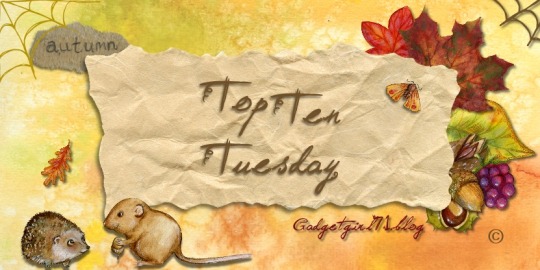
Top Ten Tuesday 22 September 2020
Welcome to this weeks Top Ten Tuesday. Originally created by The Broke & The Bookish, which is now hosted by Jana @ That Artsy Reader Girl. Each week it features a book or literary themed category. This weeks prompt is:
Books On My Autumn 2020 TBR:
Meet Me in London by Georgia Toffolo

What do you do when your fake engagement starts to feel too real…
Aspiring clothes designer Victoria Scott spends her days working in a bar in Chelsea, and her evenings designing vintage clothes, dreaming of one day opening her own boutique. But these aspirations are under threat from the new department store opening at the end of her road. She needs a Christmas miracle, but one is not forthcoming.
Oliver Russell’s Christmas is not looking very festive right now. His family’s new London department store opening is behind schedule, and on top of that his interfering, if well meaning, mother is pressing him to introduce his girlfriend to her. A girlfriend who does not exist. He needs a diversion. Something to keep his mother from interfering while he focuses on the business.
When Oliver meets Victoria, he offers a proposition: pretend to be his girlfriend at the opening of his store and he will provide an opportunity for Victoria to showcase her designs. But what starts as a business arrangement soon becomes something more tempting, as the fake relationship starts to feel very real. But when secrets in Victoria’s past are exposed will Oliver walk away, or will they both follow their hearts and find what neither knew they were looking for…
Breathless by Jennifer Niven
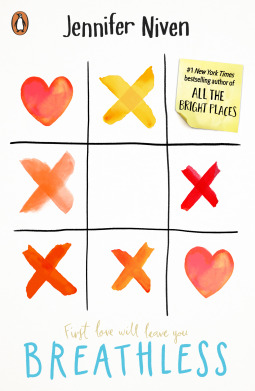
From Jennifer Niven, the New York Times bestselling author of All the Bright Places, comes an unforgettable new novel about a sensitive girl ready to live her bravest life–sex, heartbreak, family dramas, and all.
Before: With graduation on the horizon, budding writer Claudine Henry is making plans: college in the fall, become a famous author, and maybe–finally–have sex. She doesn’t even need to be in love. Then her dad drops a bombshell: he’s leaving Claude’s mother. Suddenly, Claude’s entire world feels like a lie, and her future anything but under control.
After: Claude’s mom whisks them away to the last place Claude could imagine nursing a broken heart: a remote, mosquito-infested island off the coast of Georgia. But then Jeremiah Crew happens. Miah is a local trail guide with a passion for photography–and a past he doesn’t like to talk about. He’s brash and enigmatic, and even more infuriatingly, he’s the only one who seems to see Claude for who she wants to be. So when Claude decides to sleep with Miah, she tells herself it’s just sex, nothing more. There’s not enough time to fall in love, especially if it means putting her already broken heart at risk.
Compulsively readable and impossible to forget, Jennifer Niven’s luminous new novel is an insightful portrait of a young woman ready to write her own story.
The Illustrated Child by Polly Crosby

Romilly lives in a ramshackle house with her eccentric artist father and her cat, Monty. She knows little about her past – but she knows that she is loved.
When her father finds fame with a series of children’s books starring her as the main character, everything changes: exotic foods appear on the table, her father appears on TV, and strangers appear at their door, convinced the books contain a treasure hunt leading to a glittering prize.
But as time passes, Romilly’s father becomes increasingly suspicious of everything around him, until, before her eyes, he begins to disappear altogether.
In her increasingly isolated world, Romilly turns to the secrets her father has hidden in his illustrated books, realising that there is something far darker and more devastating locked within the pages…
The truth.
The Illustrated Child is the unforgettable, beguiling debut from Polly Crosby.
Ghosts by Dolly Alderton

Nina Dean has arrived at her early thirties as a successful food writer with loving friends and family, plus a new home and neighbourhood. When she meets Max, a beguiling romantic hero who tells her on date one that he’s going to marry her, it feels like all is going to plan.
A new relationship couldn’t have come at a better time – her thirties have not been the liberating, uncomplicated experience she was sold. Everywhere she turns, she is reminded of time passing and opportunities dwindling. Friendships are fading, ex-boyfriends are moving on and, worse, everyone’s moving to the suburbs. There’s no solace to be found in her family, with a mum who’s caught in a baffling mid-life makeover and a beloved dad who is vanishing in slow-motion into dementia.
Dolly Alderton’s debut novel is funny and tender, filled with whip-smart observations about relationships, family, memory, and how we live now.
Friends and Strangers by J Courtney Sullivan
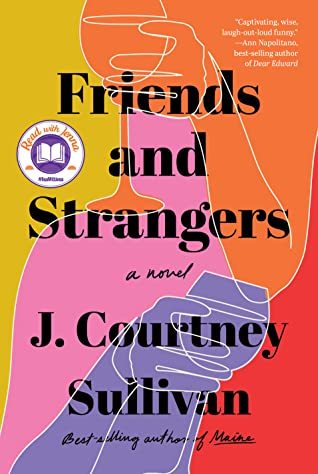
An insightful, hilarious, and compulsively readable novel about a complicated friendship between two women who are at two very different stages in life, from the best-selling author of Maine and Saints for All Occasions (named one of the Washington Post’s Ten Best Books of the Year and a New York Times Critics’ Pick).
Elisabeth, an accomplished journalist and new mother, is struggling to adjust to life in a small town after nearly twenty years in New York City. Alone in the house with her infant son all day (and awake with him much of the night), she feels uneasy, adrift. She neglects her work, losing untold hours to her Brooklyn moms’ Facebook group, her “influencer” sister’s Instagram feed, and text messages with the best friend she never sees anymore.
Enter Sam, a senior at the local women’s college, whom Elisabeth hires to babysit. Sam is struggling to decide between the path she’s always planned on and a romantic entanglement that threatens her ambition. She’s worried about student loan debt and what the future holds. In short order, they grow close. But when Sam finds an unlikely kindred spirit in Elisabeth’s father-in-law, the true differences between the women’s lives become starkly revealed and a betrayal has devastating consequences.
A masterful exploration of motherhood, power dynamics, and privilege in its many forms, Friends and Strangers reveals how a single year can shape the course of a life.
Our Story by Miranda Dickinson
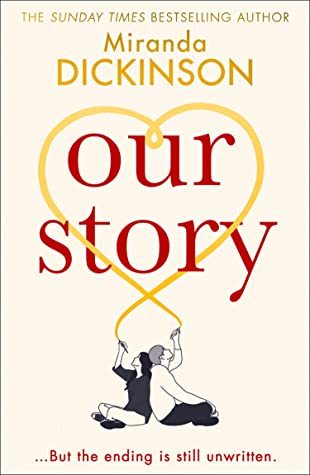
Otty has just landed her dream job. She’s about to join the writing team of one of the most respected showrunners in TV. And then the night before her first day, she’s evicted from her flat.
Joe has been working with Russell for years. He’s the best writer on his team, but lately something has been off. He’s trying to get his mojo back, but when his flatmate moves out without warning he has other things to worry about.
Otty moving into Joe’s house seems like the most obvious solution to both their problems, but neither is prepared for what happens next. Paired together in the writing room, their obvious chemistry sparks from the page and they are the writing duo to beat. But their relationship off the page is an entirely different story, and neither of them can figure out why.
And suddenly the question isn’t, will they, or won’t they? It’s why won’t they?
An epic and modern love story for our times, we will all see ourselves reflected in Otty and Joe. We are our own biggest barriers and this novel explores what happens when we get out of our own way. And it is glorious.
From Breath and Ruin (Elements of Five Book 1) by Carrie Ann Ryan
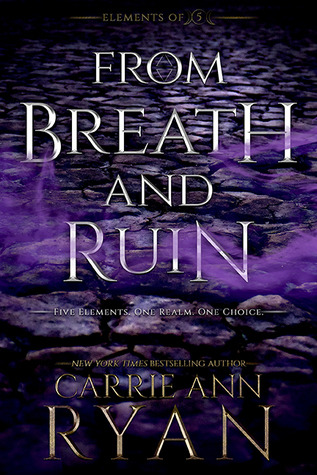
New York Times bestselling author Carrie Ann Ryan dives into a world with magic and sacrifice with the Elements of Five.
It is said the Spirit Priestess will one day unite the two Kingdoms of the Maison Realm. She will one day fight alongside Wielders and unlock the five elements of power.
It wasn’t until I nearly died that I realized they were talking about me. They tell me I have the power to save the world, and yet the war raging around me seems insurmountable. I must rely on those I thought shunned me long ago: a boy who isn’t who I thought, and a new realm of warriors who have come to protect me.
The darkness is coming, and the Queen of Obscurité wants to ensure that the King of Lumière can’t get his hands on me. And to make that happen, the Queen will sacrifice anything—including me.
Reflect (Reclaim Trilogy Book 1) by Jess Booth & Joanna Reeder

Their romance only lasted a short few months… but that was more than 100 years ago.
Ever since his fiancé, Gemma MacLugh, was killed at the hands of a dragon shifter, vampire Leif Villers has mourned his loss. Still, a part of him never gave up on her. He could hear her voice, feel her love even through the grave, relive her memories over and over until they were stripped from him.
Now Leif has discovered the final piece to bring her back from death’s clutches. He carried her brooch, never knowing it held the key to resurrecting his love.
Too bad it’s now in the hands of the formidable kraken shifter who nearly destroyed the Shifter Academy in the recent vampire/shifter war and then slithered away, never to be seen again.
Across time, powerful selkie Gemma MacLugh–a magic user who can shape-shift into a seal–should have a wonderful, comfortable existence at her home in New York in 1897. But jealous sisters target her with their cruelty, making life miserable. If not for her Grandmother and her best friend and fellow selkie, Frederick, things might have been truly unbearable.
But when a mermaid seer foretells her upcoming death and opportunity arises to leave her home and travel across the country to a boarding house in Washington, she takes it.
To get away from her cruel sisters.
To escape her destiny.
But is it luck or fate’s final joke when she meets a tall, dark and handsome man by the name of Leif Villers?
Their love will challenge time and death itself, but can Leif get Gemma back? Can Gemma truly escape her fate?
**Reflect is the first book in the Reclaim Trilogy within the Shifter Academy Universe written by USA Today Bestselling Authors, Jesse Booth and Joanna Reeder**
The Trials of Koli (Rampart Trilogy Book 2) by M R Carey

The Trials of Koli is the second novel in M R. Carey’s breathtakingly original Rampart trilogy, set in a strange and deadly world of our own making.
Beyond the walls of Koli’s small village lies a fearsome landscape filled with choker trees, vicious beasts and shunned men. As an exile, Koli’s been forced to journey out into this mysterious, hostile world. But he heard a story, once. A story about lost London, and the mysterious tech of the Old Times that may still be there. If Koli can find it, there may still be a way for him to redeem himself – by saving what’s left of humankind.
The Golden Hour by Beatriz Williams

The New York Times bestselling author of The Summer Wives and A Certain Age creates a dazzling epic of World War II-era Nassau—a hotbed of spies, traitors, and the most infamous couple of the age, the Duke and Duchess of Windsor.
The Bahamas, 1941. Newly-widowed Leonora “Lulu” Randolph arrives in Nassau to investigate the Governor and his wife for a New York society magazine. After all, American readers have an insatiable appetite for news of the Duke and Duchess of Windsor, that glamorous couple whose love affair nearly brought the British monarchy to its knees five years earlier. What more intriguing backdrop for their romance than a wartime Caribbean paradise, a colonial playground for kingpins of ill-gotten empires?
Or so Lulu imagines. But as she infiltrates the Duke and Duchess’s social circle, and the powerful cabal that controls the islands’ political and financial affairs, she uncovers evidence that beneath the glister of Wallis and Edward’s marriage lies an ugly—and even treasonous—reality. In fact, Windsor-era Nassau seethes with spies, financial swindles, and racial tension, and in the middle of it all stands Benedict Thorpe: a scientist of tremendous charm and murky national loyalties. Inevitably, the willful and wounded Lulu falls in love.
Then Nassau’s wealthiest man is murdered in one of the most notorious cases of the century, and the resulting coverup reeks of royal privilege. Benedict Thorpe disappears without a trace, and Lulu embarks on a journey to London and beyond to unpick Thorpe’s complicated family history: a fateful love affair, a wartime tragedy, and a mother from whom all joy is stolen.
The stories of two unforgettable women thread together in this extraordinary epic of espionage, sacrifice, human love, and human courage, set against a shocking true crime . . . and the rise and fall of a legendary royal couple.
Until next Tuesday
#JustForFun, #Top Ten Tuesday, #TopTenTuesday, #TTT
0 notes
Text
Advocates and the media deemed Mr. Trump’s non-racial denunciation of Baltimore’s leadership racist. Never mind that the victims of the city’s almost daily drive-by shootings are black. Race shields minority politicians from criticism. — Heather Mac Donald
It’s the page one story in today’s (08-19-19) New York Times:
“What the reactionary politics of 2019
owe to the politics of slavery.”
“America holds onto an undemocratic assumption from its founding: that some people deserve more power than others.”
Get used to it. America’s newspaper of record has pivoted from Trump colluded with Russia to Trump is a Racist who, in any case, must be denounced, delegitimized, and defeated.
This slideshow requires JavaScript.
A newsroom revolt over an unintentionally pro-Trump headline after the El Paso mass shootings brought the Times’ shift in tactics out into the open. The rest of the liberal-progressive-socialist media is clambering on board. The offending headline, “Trump urges unity vs. racism,” was quickly scrapped for wording more hostile to the President.
To quell its restive scribblers, Times editor Dean Baquet did some fancy footwork. According to a leaked transcript:
This is a really hard story … it went from being a story about whether the Trump campaign had colluded with Russia and obstruction of justice to being a more head-on story about the president’s character. We built our newsroom to cover one story, and we did it truly well. Now we have to regroup, and shift resources and emphasis to take on a different story. … It is a story that requires deep investigation into people who peddle hatred, but it is also a story that requires imaginative use of all our muscles to write about race and class in a deeper way than we have in years….
‘That “one story” was Russian collusion.
This slideshow requires JavaScript.
Holy shit!
The day Bob Mueller walked off that witness stand … Our readers who want Donald Trump to go away suddenly thought, “Holy shit, Bob Mueller is not going to do it.”
Byron York writes in the Washington Examiner:
Baquet used the gentlest terms possible — “the story changed” — but the fact is, the conspiracy-coordination allegation the Times had devoted itself to pursuing turned out to be false. Beyond that, Democrats on Capitol Hill struggled to press an obstruction case against the president. The Trump-Russia hole came up dry.
One Times staffer captured the consensus of the newsroom this way: “I just feel like racism is in everything. It should be considered in our science reporting, in our culture reporting, in our national reporting.”
Blaska has skin in this game (offensively white though that skin be). He was labeled a white supremacist for demanding a return to discipline in the classroom because “everybody knows” that:
that minority race students act out disproportionately (but only because of 400 years of oppression) or if they don’t it’s because
racist teachers, police and society unfairly single them out while ignoring white kids brawling in the cafeteria and shooting up the school bus. Really!
If you can hear the dog whistle …
… you’re the dog! When Elizabeth Warren can mischaracterize Michael Brown’s shooting in Ferguson MO as “murder” …
The essential Heather Mac Donald in the Wall Street Journal, offers this corrective:
“Trump isn’t the one dividing us by race.”

Mr. Trump rarely uses racial categories in his speech or his tweets. It is the media and Democratic leaders who routinely characterize individuals and groups by race and issue race-based denunciations of large parts of the American polity.
Some examples: “As race dominates the political conversation, 10 white Democratic candidates will take the stage” (the Washington Post); Mr. Trump’s rally audiences are “overwhelmingly white” (multiple sources); your son’s “whiteness is what protects him from not [sic] being shot” by the police ( Sen. Kirsten Gillibrand );
Identity politics, now a driving force in the Democratic Party, celebrates the racial and ethnic identities of designated victim groups while consigning whites — especially heterosexual white men — to scapegoat status.
More Heather Mac Donald:
Susan Rice, President Obama’s national security adviser, recently denounced Mr. Trump’s “almost daily attacks on black and brown people.” But … Trump’s attacks on his fellow 2016 candidates — and on more-recent adversaries as homogeneous as Robert Mueller, Rep. Adam Schiff, Joe Biden and Ms. Warren — were as nasty as anything he’s directed at Rep. Elijah Cummings or Rep. Ilhan Omar.
Blaska’s Bottom Line: The truth is, Donald Trump is a mean-spirited but equal opportunity insult artist — Don Rickles without the punch line. Waiting for that first Democrat to declare, “Enough of the race-baiting. It’s time to judge people by their actions.”
What do YOU think?
Mainstream news media pivots from Russian collusion to ‘Trump is a racist’ Advocates and the media deemed Mr. Trump’s non-racial denunciation of Baltimore’s leadership racist. Never mind that the victims of the city’s almost daily drive-by shootings are black.
0 notes
Text
beginning
Anneli Knight first appeared in the sunlit second floor window of the Shakespeare & Company bookshop. It was my first day in Paris, and she leaned out over the flowerbox and waved at me like we already knew each other, and for a heartbeat I truly felt like we did.
I'd been talking to Joe, a man I recognized from my youth hostel who happened to be selling his artwork on the street outside the bookstore. Joe was the oldest person in the hostel by about a foot and a half of white beard, and he'd been traveling from Canada to Paris since the 70s to draw intricate street scenes and sell his work in front of Shakespeare & Company. He looked like a hippie Walt Whitman in a floppy hat and a faded Key West t-shirt, the only one I ever saw him wear.
"Hello, Joe!" Anneli called from the window.
"Hey, Anneli! Come down and meet a friend of mine.”
"I'll be right there!"
She shut the window, which was painted with a portrait of Virginia Woolf reading a book, and in a moment she was emerging from the ancient blue door that led to the apartments above the bookshop. I still remember what she was wearing. Red pants and a delicate black button-up with a pretty gold pin holding the collar together. The most beautiful array of freckles and eyes that smiled right at you.
Barely two minutes after Joe introduced us as fellow gap year travelers, Anneli pronounced us kindred spirits. We were both eighteen years old, trying to call ourselves writers and artists, but feeling too young and too small to name ourselves after our dreams.
Anneli had left the farm outside of London where she’d grown up and was currently living at Shakespeare & Co as a tumbleweed. That’s what the employees called the young travellers taken in by the bookshop and given a free place to stay, read, and write in exchange for a few hours of work a day. I'd come to Paris specifically to take part in the shop's age-old tradition, to join the list of tumbleweeds that included Ernest Hemingway and Allen Ginsberg, but there was just one problem.
"Please don't tell anyone I told you this, but the shop is having a bit of trouble with bedbugs," Anneli whispered.
She pointed out the bites on her arms and neck, and told me to talk to the bookstore managers about whether or not I could move in after they fumigated the tumbleweed living quarters. I told her I would come back every day until they let me in, bedbugs or not, and she beamed and hugged me tightly.
"That's the spirit!"
Anneli gave me a long list of cafes, shops, and museums I should visit in the meantime.
"I'm only one of two tumbleweeds at the moment, and we get a bit lonely sometimes. We should have a late-night picnic soon and split a bottle of wine."
I agreed, and told her I was starving, and she recommended a place around the corner that sold cheap but delicious sandwiches.
"And they've got meringues piled in the window the size of your head, in every flavor and color you can imagine!"
She explained that she had to get back to a piece she was writing, and made me promise to meet her here again tomorrow to discuss me becoming a tumbleweed. Joe had wandered off to work on a drawing, and I was overwhelmed with the happiness of making a friend in a foreign country, a true kindred spirit.
We hugged and said goodbye multiple times, as she kept remembering places she wanted to show me, stories to tell me, and cafes to recommend. She disappeared through the big blue door, back into the bookstore of my dreams, leaving me breathless with joy and anticipation and the sense that I was exactly where I was supposed to be.
-
Postponing college was never my plan. Everything leading up to my graduation from high school had been only a series of tedious stepping stones on my way to what I considered The Rest of My Life; college in a big city, jobs and internships in the movie industry, and making it as a director by the time I was thirty. I had everything planned out, with no room for scenic routes of indecision or wandering. But when I was accepted into my dream school only to find that its tuition had been raised too much for me to attend, I had to rethink the plans I’d been making since I was eleven. I knew I had to get away from home, away from boarding school, away from everything I thought I knew about myself. I needed time to breathe and think, and a space far away from my plans where I could reevaluate who I was, with no agenda.
So I ended up with a one-way ticket to Europe, my entire life savings, and a single backpack, with no idea what I was doing. I’d read that Shakespeare and Company, the hundred-year-old bookstore that first published James Joyce and was a regular haunt of many of my favorite writers, let young travelers sleep among the bookshelves for free. They didn’t take reservations, and they gave no guarantees. All I had to do was show up in person and ask if there was room. It was the only plan I allowed myself to make.
I ate my sandwich and meringue lunch on a park bench in front of Notre Dame, the crumbs calling on a flock of pigeons to poke around my feet. It was a beautiful and warm September day, but the excitement inspired by meeting Joe and Anneli grew heavy and cold and tinged with a sudden feeling of distrust. I felt like a living cliche. A lost American would-be artist who travels to Paris for inspiration is the set-up for a story that’s been lived many times before. Watching the tourists take selfies with the statues, I licked my fingers clean of the sugar dust left by the meringue and opened my notebook, but couldn’t bring myself to write anything down. What was the point? It had all been written, hadn’t it?
The sunshine feels different here, and the sky is a slightly brighter shade of blue.
I cringed at the thought, and stuffed my notebook down into my bag with the rest of the unfinished sandwich I was saving for dinner.
I tried to walk around the city but ended up being drawn back to the bookstore. I was afraid that straying too far would make it disappear, that if I was gone for too long I’d return to find that Joe and Anneli had been figments of my imagination, just stories I’d told myself to live up to the cliche. I’d been in Paris for one day, and it was all feeling too good to be true.
Back on the cobbled sidewalk in front of Shakespeare & Co., Joe was drinking coffee and hanging his art on the iron fence of the small park that separated the bookshop from the busy street. He waved to me as I passed by, and asked me to join him after I explored the shop for a while.
Inside, I climbed the thin wooden stairs to the second floor and wandered through the quiet bookshelves. I picked up the newly-published history of the Shakespeare and Company bookshop and settled into a chair in the back to read. Flipping through the pages, I read about the shop’s humble beginnings and descriptions of the lost generation of expatriate authors and artists who flocked to its doorstep, the lost generation who found themselves in great works like A Moveable Feast, Ulysses, and The Great Gatsby.
I came upon a chapter of journal entries by past tumbleweeds from the sixties and seventies. In it were photographs of young hippies and intellectuals shelving books and drinking wine over their typewriters, fellow runaways and gap-year travellers smiling up from the faded polaroids and blurry snapshots. They looked like Anneli, like versions of myself in a past life I was desperately trying to reincarnate.
I turned a page and froze. It was a photograph of Allen Ginsberg tucked into a small bed surrounded by walls of books. Closing my finger between the pages to save my place, I stood up from the chair and walked into the bookstore’s adjacent room, where the stairs let out into a narrow hallway lined by bookshelves that led to a raised platform covered in pillows against the back wall. I opened the book again and held it up, matching the angle of the photo to the scene before me.
I closed the book and sat down on the platform, which was essentially a bench, just long and wide enough for a person to sleep on. How many writers, famous or otherwise, had slept here, dreaming my dreams and hoping for the same inspiration I hoped to find within these book-lined walls?
I reshelved the book and wandered outside. The sun was starting to set and the golden glow of Paris in the early evening made everything look like an oversaturated movie. I sat down next to Joe, who was still sipping his coffee as he watched the people come and go.
We chatted about the day, the beautiful weather and the crowds of tourists who seemed to only care about getting a selfie in front of the shop’s signature portrait of the Bard above the door.
“Why do you think people keep coming here?” I asked. “Being a tumbleweed seems like the perfect situation for any young aspiring writer, but aren’t they all just trying to be the next Hemingway or something?”
“Oh, I don’t know,” Joe sighed in his strong Canadian accent. “I think there’s a kind of magic in this place, whether it’s a part of the bookshop itself or just made up of all the stories of folks that come through here. Certain people are drawn to it, I guess.”
“It just seems like a magnet for cliches.”
“Maybe. But stories have to start somewhere, even before they become cliches.” Joe laughed. “Wasn’t Romeo and Juliet a cliche, even before that guy wrote it?”
He pointed at the bookshop sign where Shakespeare stared vacantly over our heads into the Paris skyline.
“Doesn’t mean it wasn’t a great story,” he said, sipping the last of his coffee.
-
I spent the next day at Shakespeare & Co., reading books and talking to the shop manager, a tall Parisian man who looked like he just walked off the set of A bout de souffle, about my hopes of becoming a tumbleweed. He never mentioned the bedbugs, but he made it clear that it was unlikely they would have a place for me in the next two weeks.
My heart sank. I knew that with my small budget I wouldn’t be able to afford two more weeks at the youth hostel where Joe and I had eaten breakfast together that morning.
As the day went on, I continued reading biographies of past tumbleweeds and flipping through photographs for familiar faces of my favorite writers. I found a portrait of Ginsberg hanging above the second floor window that looked out over the cobbled sidewalk where Joe sat and talked to customers and passers-by.
I still couldn’t bring myself to write anything in my notebook. Even ‘Paris is too good to be true’ felt trite and obvious, too defeating to put those words on paper.
I felt a tap on my shoulder and looked up from the empty page.
“Are you staying for the reading event tonight?” Anneli asked, grinning and itching a bug bite on her neck.
I smiled. Of course I was.
The event was a small celebration of a newly published book by a past tumbleweed who now worked full-time in the shop. Anneli read an excerpt and served wine to the twenty or so guests who sat on pillows on the floor as the author answered questions posed by his readers and other bookshop employees. When she wasn’t fulfilling her tumbleweed duties of refilling glasses and leading guests to their seats, Anneli sat next to me, occasionally squeezing my hand and smiling at me as she did when we first met.
After the questions finished and the wine was gone, the event ended, and I helped Anneli restore the pillows to their rightful place on the empty tumbleweed beds.
“Don’t go anywhere,” she said, picking up a tray of empty glasses and heading for the basement. “I’m getting a bottle of wine and a box of crackers for our picnic.”
-
It was almost chilly outside by the river, but the wine kept us warm and everyone was laughing. There were three of us besides me and Anneli; Jess, the second tumbleweed and native of New Zealand, and two other shop employees I’d been introduced to on the walk from the bookshop to our picnic spot on the stone quai, where our feet dangled over the water and we let crumbs fall into is dirty, glittering swirls.
“Does this ever get old?” I asked, gesturing to the golden towers of Notre Dame that loomed over us.
“Never!” Anneli exclaimed.
Everyone agreed, and chimed a haphazard toast to Paris.
“Sometimes I do feel a bit ridiculous,” she said, taking a swig from the bottle of wine. “I actually wrote a poem on a typewriter today, and it was awful.” She hiccupped and laughed. “I feel so cliche.”
“Everyone does,” said one of the booksellers, smiling as he lit his cigarette. “I mean, just look at us.”
“And isn’t that kind of wonderful?” Jess asked. “I know we’ll never be the next Scott and Zeldas, but we’re here! We get to make up our own stories right where they lived theirs!”
I felt a sudden surge of warm butterflies in my stomach. Maybe it was the wine. Maybe it was the exhilaration of a new friendship, and the feeling that I wasn’t alone. But it all felt like I was living a miracle. The magic that Joe was talking about became real in that moment, as cliche as it sounds. Maybe there’s a certain kind of power inherent in the stories that repeat themselves over history. Perhaps star-crossed lovers and self-searching travelers exist as a fundamental story in human nature. Repeat these stories enough, and they become legends.
-
Meeting Joe and Anneli really was a miracle, the first fallen dominoes in a series of stories that spread from the streets of Paris to the countryside of England, and back again to Shakespeare & Company, where it all began.
0 notes